The Personality of Othello
奥赛罗
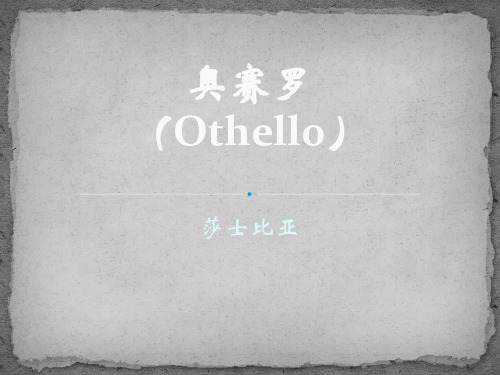
剧本赏析
Othello’s true love to Desdemona was utilized by Iago who had ulterior motive . Driven by jealousy , Othello readily believed Iago , and personally killed his own wife , and eventually drew his sword to cut his own throat .
A Midsummer Night’s Dream
4
characters
BrabantioDesdemona’s father , Venetian senator
OthelloVenetian general, protagonist
CassioOthello’s lieutenant
What’s worse, Iago hides Desdemona’s handkerchief in Cassio’ lodgings which convinces Othello the affair that they are having.
Act 4
Iago cunningly talks to Cassio about Cassio’s wife which results in Othello’s misunderstanding that Cassio has indeed sleeps with Desdemona.
Act 2
He firstly asked Roderigo to kill Cassio who is just standing in his way. Then he tells Cassio to have a conversation with Desdemona so as to gain Othello’s trust.
Othello英文ppt
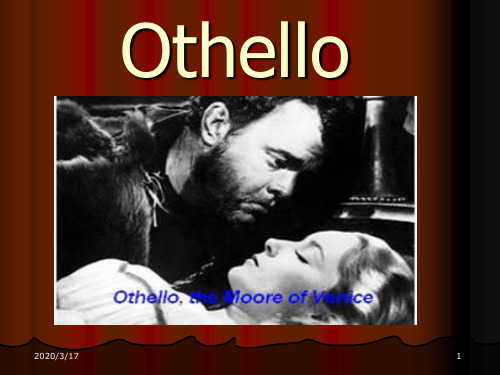
Main Plot
Othello is one of Shakespeare‘s greatest
tragedies, the play tells the hero Othello and Desdemona were framed(陷害) by Iago, eventually leading to a tragic fate. Desdemona has been falsely accused of adultery(通奸) with others and was killed by Ohello. After understanding the truth Othello killed himself with full of guilty.
2020/3/17 10
Best lines
Good name in man and woman, dear my lord, is the immediate jewel of their souls: Who steals my purse steals trash; ’tis something, nothing. (Othello 3.3)
2020/3/17
9
Theme (3)—racial prejudice
Though well-known as a soldier and in high position, Othello has been a man living in loneliness, because he is black. The citizens of Venice seem to be treating him as one of themselves, but to have him marry one of their daughter is quite another matter. Here we can find strong racial prejudice against the black.
英语专业英美文学论文题目大全

论《雾都孤儿》的幽默艺术Tom Jones, a Dissipated but Kindhearted Man放荡而又善良的汤姆琼斯The Free Will and Rebellious Spirit in Paradise Lost《失乐园》中的自由意志和反叛精神On the Development of Shylock’s Character论夏洛克的性格发展Morality and Criticism in Tom Jones评《汤姆•琼斯》中的道德观与批评观On Imogen,the New Feminine Image in Cymbeline论《辛白林》中伊慕琴的新女性形象Burns’View on Love and Friendship论彭斯的爱情友谊观The Reflection of Art and Life in Ode on a Grecian Urn and Ode on a Nightingale《希腊古瓮颂》与《夜莺颂》中艺术与生活的对照The Womanism in "The Color Purple"On the Differences between Chinese and Westerners in Non-language Communication谈中国人和英美人非语言交际的差异On the Contribution of the American Blacks during American Civil War美国黑人在美国历史上的贡献On American Black English浅谈美国黑人英语On the Differences of the Marriage Concept between Chinese and American浅谈中美婚姻观念的差异A Contrastive Analysis of Table Manners and Culture between China and Western Countries On the Ideological Content in Bacon’s Essays论培根散文的思想性Women's Movement in 1960s in American美国六十年代的妇女运动Analysis the negative effects of violent television and movie on children浅析影视暴力对青少年儿童的负面影响The Influence of Chinese Cultural Circumstances on English Learning汉语环境对英语学习的影响A Comprehension of Male Centrad Literature through A Doll’s House黑色的坚毅——小说《飘》主人公的性格分析Black Determination——An Analysis of the Personalities of the Main Character in Gone with the Wind从浪漫走向世俗的新型女性——《理智与情感》中玛丽安的性格分析人性的扭曲信任的危机--重读《奥》剧杂感Random Thoughts on Othello爱情叙写与人性魅力--论《红与黑》中两位女主角Love Account and Human Fascination-- On the Two Heroines in "The Red and the Black"风暴之女--艾米莉·勃朗特--评析作家经历和性格对作品的影响《荒野的呼唤》中"巴克"的多重性格分析Analysis of the Complicated Nature of Buck in ″The Call of the Wild″《呼啸山庄》中希斯克利夫扭曲性格分析《裸者与死者》中的受虐性格分析Analysis of the Masochistic Character Portrayed in The Naked and the Dead压抑与扭曲的灵魂——霍桑《红字》主人公人物性格分析The Constrained and Distorted Soul ——the Analysis of the Protagonists Disposition of "The Scarlet Letter"财经类院校英语专业"体验英美文学"教学模式探究On the Teaching Strategy of Experiencing British and American Literature英美文学虚拟教学课堂的架构设计The Architecture Designing of Virtual Classroom of British and American Literature高校英语专业英美文学课程的现代教学思路增强英美文学意识促进英语语言教学当代英美文学的存在主义解读Interpreting Contemporary British and American Literature From the Angle of Existentialism奈保尔的旁观者写作视角与象征写作手法Onlooker's Perspective and Symbolism ofV.S .Naipaul's Writing福克纳小说中象征隐喻手法微探On the Skill of Symbolic Metaphor in Faulkner' Novels詹姆斯·乔伊斯作品中象征主义手法的运用有组织的混乱,制度化了的疯狂——透视《第二十二条军规》的写作手法Organized disorder and the systemized chaotic society试析《这里的黎明静悄悄》小说的写作手法中国象征派诗歌与西方象征主义之关系浅探Relation between Chinese Symbolic Poetry and the Western Symbolism战争的棋子——茨威格笔下受战争戕害的人物分析The Chess of the War——The Analysis of the Victim in the War from Zweig沉重的背叛——《生命中不能承受之轻》主人公萨宾娜人物分析The oppressive betrayal——The character analysis of the heroine, Sabina, in The Unbearable Lightness of Being Hester and Dimmesdale’s Attitudes towards Love and life in The Scarlet Letter论《红字》中海斯特和丁梅斯代尔对爱情、罪恶、生活的态度On Sister Carrie’s Criticism upon American SocietyOn Scarlett’s Attitude towards Life关于斯佳丽的生活观On the Characterization of Picaresque Huck论哈克的流浪汉形象On the Moral Spirit in the Great Gatsby.论《了不起的盖茨比》中的道德观Thomas Hardy’s Pessimism in Tess of the D’urbervellesA Study of Tom Joad in the Grapes of Wrath《愤怒的葡萄》的中汤姆•约德研究Mark Twain’s Linguistic Style in The Adventures of Tom SawyerOn the Characteristics of Uncle Tom汤姆叔叔的性格分析A Study of the Themes in a Farewell to ArmsThe Tragic Fate of “a Pure Woman”in the Conflict of the Individual and the Society“一个纯洁女人”在人与社会发展冲突中的悲剧命运On the Language Style of a Midsummer-Night's Dream论《仲夏夜之梦》的语言风格The Social Significance of Swift's Gulliver's TravelsThe Psychological Analysis in Macbeth论莎士比亚《麦克白》的心理刻画Inflexible Ada in Cold Mountain《冷山》中执著的艾达On the Romanticism and Realism of Alice in Wonderland论爱丽丝梦游仙境的童话性与现实性On the Tragicomedy of Rebecca in Vanity Fair论《名利场》中利蓓加的悲喜一生On the Humour of Oliver Twist英美文学论文题目1. A Study of The Gift of Magi2. A Brief Comment on An American Tragedy3.On Motif of The Call of the World4.Love Tragedy and War—An Analysis of A Farewell to Arms5. A Study of Sister Carrie6.The Evil of Mankind Portrayed in Moby Dick7.On Henry Heming in The Red Badge of Courage8.Emily Dickinson and her Poems9.Analysis of A Rose of Emily10.Analysis of the theme of Adventures of Huckleberry Finn11.On the symbolism of The Old Men and the Sea12.The Language of Shakespeare’s Sonnets13.Deep Love And Deep Hatred—A Brief Analysis of Wuthering Heights14.Psychological Descriptions In Hemingway’s The Snows Of Kilimajaro15.On Ernest Hemingway And His Novel The Sun Also Rises16.The Literature Characteristics in A Tale of Two Cities17.On the Symbolism of D.H. Lawrence’s The Rainbow18.Love and Loss in Alfred, Lord Tennyson’s Poetry19.How Emily Dickinson’s Lyrics Resemble Hymn20.The Humor of Robert Frost21.Folk Elements in the Poetry of Langston Hughes22.John Keats’s Sensuous Imagery23.The Vocabulary of Music in Poems of Wallace Stevens24.Non-free Verse: Patterns of Sound in three Poems of William Carlos Williamsngston Hughes, Gwendolyn Brooks, and Dudley Randall as Prophets of Social Chang26.What It Is to Be a Woman: The Special Knowledge of Sylvia Plath,Anne Sexton, andAdrienne Rich27.Popular Culture as Reflected in the Poetry of Wendy Cope, Michael B. Stillman, Gene Fehler,and Charles Martin28.The Complex Relations Between Fathers and Sons in the Poetry of Robert Hayden, AndrewHudgins, and Robert Philips29.Making up New Words for New Meanings: Neologisms in Lewis Carroli and Kay Ryan30. A Brief Analysis of the Heroine Personality in Jane Eyre 《简爱》的主人翁个性分析31. A Brief Comment on O’Henry Short Stories 亨利的短篇小说述评32. A Comment on Hardy’s Fatalism 评哈代的宿命论33. A Comparison between the Themes of Pilgrimage to the West and Pilgrim’s Progress 《西游记》与《天路历程》主题的比较34. A Probe into the Feminist Idea of Jane Eyre 《简爱》男女平等思想的探索35. A Study of Native American Literature 美国本土文学的研究36. About the Breaking of American Dream from the Great Gatsby 从《了不起的盖茨比》看美国梦的破碎37. Humor and Satire in Pride and Prejudice 《傲慢与偏见》的幽默与讽刺38.Influence of Mark Twain’s Works in China 马克吐温的作品在中国的影响39.Love Tragedy and War—An Analysis of A Farewell to Arms40.Sister Carrie and Jennie Gerhardt41.The Evil of Mankind Portayed in Moby Dick42.On Henry Heming in The Red Badge of Courage43.Emily Dickingson and her Poems44.Analy sis of “A Rose of Emily”45.The Aesthetic Interpretation of Ezra Pound's Poetry46.Symbolism in The Great Gatsby47.an Analysis of the theme of Adventures of Huckleberry Finn48.On the symbolism of The Old Men and the Sea49.Cultural Shocks in the English Language Textbooks50.Deep Love And Deep Hate—A Brief Analysis On Wuthering Heights51.Psychological Descriptions In Hemingway’s The Snows Of Kilimajaro52.On Ernest Hemingway And His Novel The Sun Also Rises53.Difference Between China And The West Reflected In Social Manners54.First Love, Lost Love in George Eliot’s Adam Bede55.鸟的赞歌--------评英国浪漫派诗歌56.《呼啸山庄》的悲剧分析57.海明威英汉形象和冰山风格58.《名利场》的现实意义59.苔丝的形象分析60.哈姆雷特的犹豫再探讨61.爱伦坡小说的艺术创作成就62.爱伦坡小说人物塑造63.O Neill剧作对美国戏剧的影响64.华兹华斯的语言风格65.华兹华斯的自然观66.诗人哈代67.简述哈代的悲剧性叙事艺术On Hardy's tragedy narrative art68.奥斯丁与勃朗特写作风格异同The comparison between Austen and Bronte in writing style69.杰克·伦敦(或某作家)《》(某作品)评述On Farewell to Arms of Hemingway70.浅析《失乐园》中撒旦的形象塑造71.《还乡》的悲剧艺术特色72.蓓基形象再解读73.蘩漪与伯莎梅森的比较研究74.爱玛形象的魅力75.海明威研究——浅析海明威笔下的女硬汉子76.《苔丝》的悲剧性与现代性Tragedy and Modernity in Tess of D’Urbervilles77.华兹华斯诗歌的和谐观On the View of Harmony in Wordsworth’s Poetry78.海明威小说的悲剧意识79.从《老人与海》看海明威的创作特点80.《红色英勇勋章》的叙述技巧分析81.论《白鲸》的象征含义82.论吴尔夫的《1间自己的房间》中的女权主义83.论简。
英国文学整理

古英语Anglo-Saxon PoetryRepresentative:The Story of Beowulf (national epic)Features:①alliteration头韵,②metaphors,③understatements中世纪英语1. The RomanceMatters流派: matters of Britain亚瑟王和圆桌骑士matters of Francematters of Rome起源:Celtic legends高潮: Sir Gawain and the Green Knight结束: Le Morte D’Arthur 亚瑟王之死(Thomas Malory)2. LanglandPiers the Plowman 农夫皮埃尔斯Features:①alliteration②written in the form of a dream vision通过梦揭露社会现象③an allegory using symbolism to relate truth运用象征手法的寓言故事3. The BalladsThe Geste of Robin Hood多重性格: ①勇敢聪明②慈善③敌对上层社会④宗教信仰虔诚⑤尊敬国王4. Chaucer1).the founder/father of English poetry.2).studied the poems of Dante, Petrarch, Boccaccio.文艺复兴先驱,但没传播3).French/first period:The Romaunt of the Rose玫瑰传奇(translated fromFrench)Italian/second:Troilus mand Criseyde特洛伊拉斯和克莱西德English/third:The Canterbury Tales坎特伯雷故事集(英语写作)4). The Canterbury Tales①Chaucer’s masterpiece, one of the monumental works in EnglishLiterature 巨作,英国文学里程碑作品之一②两方面把故事联系起来:the personality of the host & intimate connection between the tales and the Prologue.③The Wife of Bath④His Language:a).full of humor and satireb).vivid and exact.c).the “heroic couplet”第一个用英雄双行体d).he is the first great poet who wrote in the English language.文艺复兴时期(16th c)1.More1).prose writer2).UtopiaMore’s masterpiece, 对话形式,分两册,第一册说英国社会状况,第二册说Utopia3).评价:a far-sighted thinker有远见;one of the forerunners of modern socialist thought.社会主义思想先驱2.Edmund Spenser1).poetry writer2).The Shepherd’s Calendar3).The Faerie Queene①Spenser’s greatest work②dedicated to Queen Elizabeth献给伊莉莎白女王③主导思想:nationalism民族主义,humanism人文主义,puritanism清教主义④Spenserian Stanza斯宾塞诗节4).评价:the poet’s poet of the period.3.Francis Bacon1).essayist2).the founder of English materialist philosophy英国唯物主义思想奠基者the founder of modern science in England英国现代科学奠基者the first English essayist3).哲学作品:Advancement of Learning; New Instrument4.Drama1).the Miracle Play神秘剧the Morality Play道德剧the Interlude幕间剧the Classical Drama古典剧2).the London Theatre/Globe theatre3).university wits大学6才子Marlowe①Tamburlaine铁木耳The Jew of Malta马耳他岛的犹太人Doctor Faustus浮士德博士的悲剧(Marlowe’s masterpiece)②评价:a.the most gifted of the university wits大学6才子中最有才的b.the greatest of the pioneers of English drama英戏剧最伟大的先驱c.His work paved the way for Shakespeare为莎士比亚扫清道路5.Shakespeare(1564-1616)1). The 1st period(学徒阶段)Historical play: HenryⅥ,Parts 1,2,3亨利六世上,中,下RichardⅢ理查德三世Comedy:The Comedy of Errors错中错The Taming of the Shrew驯悍妇The Two Gentlemen of Verona委洛那二绅士Love’s Labour’s Lost空爱一场Tragedy:Titus Andronicus泰特斯•安庄尼克斯Romeo and Juliet罗密欧与朱丽叶The 2nd period(成熟阶段)Comedy: A Midsummer Night’s Dream仲夏夜之梦The Merchant of Venice威尼斯商人As You Like It 皆大欢喜Twelfth Night 第12夜The Merry Wives of Windsor温莎的风流女人Much Ado about Nothing无事生非Historical plays: RichardⅡ理查德二世HenryⅣParts1,2 亨利四世上,下HenryⅤ亨利五世King John约翰王Tragedy: Julius Caesar凯撒The 3rd period(巅峰时期)Tragedy:HamletOthelloKing LearMacbeth*Timon of Athens雅典的泰蒙Comedy:Troilus and Cressida特洛爱丽丝和克莱西达All’s Well That Ends Well终成眷属Measure for Measure恶有恶报Roman tragedy:Antony and Cleopatra安东尼和克里奥佩特拉Coriolanus克里奥兰纳斯The 4th period(暴风雨之后的宁静)Romances/reconciliation play:Pericles佩利克里斯Cymbeline辛柏林The Winter’s Tale冬天的故事Tempest暴风雨Historcal play:HenryⅧ亨利八世2).Hamlet①a book-worm书呆子a).humanist, free from medieval prejudices and superstitions.人文主义者,不受偏见和迷信影响b).he turns to those around him with the same eagerness对周边人很热心c).his intellectual genius is outstanding. He is a close observer of men and manners.对人洞察秋毫②m elancholy忧郁a).melancholy is the keynote of Hamlet性格最重要特点是忧郁b).He is beyond himself with the joy of dicoveryc).In spite of the melancholy and delay in action, he still retains his active energy.③Hamlet is a hero of the Renaissance.3).PoemsVenus and adonisThe rape of lucreceSonnets十四行诗4).Features of Shakespeare’s Drama①One of the founders of realism in world literature现实主义奠基者之一②His dramatic creation often used the method of adoption③A master hand for playwriting④Skilled in many poetic forms⑤Great master of the English language词汇量大6.Ben Jonson1).Every Man in His Humour 人人高兴Volpone 狐狸The Alchemist炼金术师Bartholomew Fair 巴托罗缪市集2).评价:literary king晚年成为当时的文学王A forerunner of classicism in English literature英文学古典主义先驱资产阶级革命时期(17th c)ton1).On the Morning of Christ’s Nativity基督诞生晨颂L’Allegro快乐的人ⅡPenseroso幽思的人Comus科玛斯(假面剧)Lycidas利西达斯Of Reformation in England论英国改革Pamphlets on MarriageAreopagitica论出版自由Defence of the English People为英国人民声辩Second Defence of the English People再为英国人民声辩Paradise Lost失乐园Paradise Regained复乐园Samson Agonistes力士参孙2).评价:①Milton was political in both his life and his art.②Milton wrote the greatest epic in English literature.③Milton is a master of the blank verse.④Milton is a great stylist.文体家⑤Milton has always been admired for his sublimity of thoughtand majesty of expression.思想崇高&表达方式华丽2.BunyanThe Pilgrim’s Progress天路历程an allegory3.Metaphysicals形而上学,玄学John Donne①The founder of the Metaphysical school of poetry.玄学创始人②Representative: Holy Sonnets4.John Dryden1).The most distinguished literary figure of the Restoration Period.2).The forerunner of the English classical school of literature in the next century.英古典主义先驱启蒙运动时期(18th c)1.Classicism2.Addison and Steele1).The Tatler闲谈者(a paper,3 times a week)In order to carry on his social criticism more effectively:①Steele wrote under the pseudonym of “Isaac Bickerstaff”.用笔名②Steele used frequently the correspondence.来信选登2).The Spectator旁观者(a daily paper)3).different stylesSteele: intimate, easy-going, carelessAddison: careful, a great stylist.His essays were the model of English composition by Britishauthors all through the 18th c.4).评价They ushered in the dawn of modern English novel迎来英小说曙光3.Pope1). Pastorals田园组诗Essay on Criticism论批评The Rape of the Lock夺发记The Iliad of Homer荷马的伊利亚特The Odyssey of Homer荷马的奥德赛The Works of Shakespeare莎士比亚集The Dunciad愚人志Essay on Man人论2).评价①an outstanding enlighterner②a master in the art of poetry③perfect in the form of heroic couplets④the most representative of the English classical poetry⑤at his best in satire and epigram擅长讽刺4.Swift1).A Tale of a Tub一个木桶的故事The Battle of the Books书的战争Bickerstaff Almanac比克斯达夫的历书Gulliver’s Travels格列佛游记The Draper’s Letters一个麻布商的书信A Modest Proposal一个小小的建议2).评价:①One of the greatest masters of English prose.②语言特色:simple,clear,vigorous,direct,precise③a master satirist, his irony is deadly讽刺大师5.Defoe1).Robinson Crusoe鲁宾孙漂流记Captain SingletonMoll Flanders 摩尔·弗兰德斯Colonel Jacque 雅克上校2).Robinson Crusoe①The writers of the Enlightenment attached great importance to the moulding of character注重人物性格塑造②Defoe glorified human labour.赞美人类劳动③The character of Robinson Crusoe is representative of the English bourgeoisie at the earlier stages of its development.书中人物是英早期资产阶级人物代表6.RichardsonPamela 帕梅拉7.Fielding1).Joseph Andrews约瑟夫•安德鲁斯的经历Jonathan Wild大人物Tom Jones汤姆琼斯Amelia阿米莉亚2).评价①Point of view:letters ; principal character ; author②Satire in Fielding’s Novels③Fielding believed in the educational function of the novel④A master of style: easy,unlaboured and familiar, but extremely vivid and vigorous 文体:不费力,随便,但生动有力⑤He established once for all the form of the modern novel.8.Johnson - Lexicographer字典编写家9.Sentimentalism3个代表:Thomas Gray;William Cowper;George Crabbe10.Pre-Romanticism前浪漫主义BlakeSongs of Innocence天真之歌Songs of Experience经验之歌The Marriage of Heaven and Hell天堂与地狱的婚姻●Burns作品特征:Scottish dialect苏格兰方言主题特征:①love & friendship②Patriotism③Supporter of the French Revolution④Sympathy for the miseries of the poor people⑤Humor and lightheartedness自由自在浪漫主义时期(1798-1832)1.escapist romanticists消极浪漫主义Passive romanticists. Lake poets湖畔诗人。
男权主义的牺牲者——浅析莎士比亚四大悲剧女主人公的悲惨命运
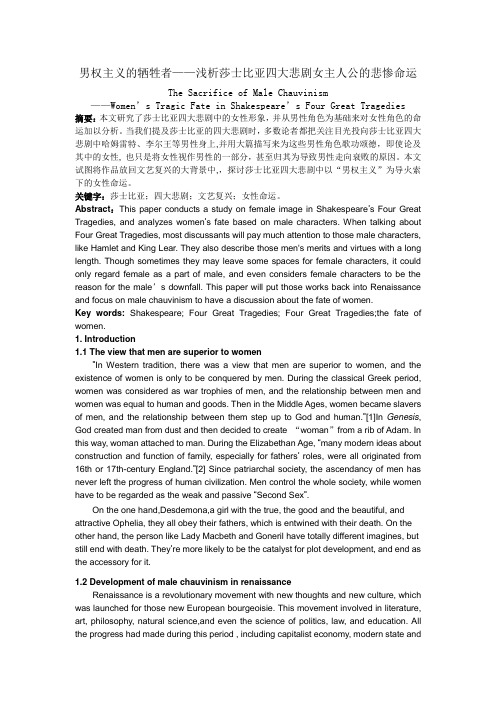
男权主义的牺牲者——浅析莎士比亚四大悲剧女主人公的悲惨命运The Sacrifice of Male Chauvinism——Women’s Tragic Fate in Shakespeare’s Four Great Tragedies摘要:本文研究了莎士比亚四大悲剧中的女性形象,并从男性角色为基础来对女性角色的命运加以分析。
当我们提及莎士比亚的四大悲剧时,多数论者都把关注目光投向莎士比亚四大悲剧中哈姆雷特、李尔王等男性身上,并用大篇描写来为这些男性角色歌功颂德,即使论及其中的女性, 也只是将女性视作男性的一部分,甚至归其为导致男性走向衰败的原因。
本文试图将作品放回文艺复兴的大背景中,,探讨莎士比亚四大悲剧中以“男权主义”为导火索下的女性命运。
关键字:莎士比亚;四大悲剧;文艺复兴;女性命运。
Abstract:This paper conducts a study on female image in Shakespeare‟s Four Great Tragedies, and analyzes women‟s fate based on male characters. When talking about Four Great Tragedies, most discussants will pay much attention to those male characters, like Hamlet and King Lear. They also describe those men's merits and virtues with a long length. Though sometimes they may leave some spaces for female characters, it could only regard female as a part of male, and even considers female characters to be the reason for the male’s downfall. This paper will put those works back into Renaissance and focus on male chauvinism to have a discussion about the fate of women.Key words:Shakespeare; Four Great Tragedies; Four Great Tragedies;the fate of women.1. Introduction1.1 The view that men are superior to women”In Western tradition, there was a view that men are superior to women, and the existence of women is only to be conquered by men. During the classical Greek period, women was considered as war trophies of men, and the relationship between men and women was equal to human and goods. Then in the Middle Ages, women became slavers of men, and the relationship between them step up to God and human.”[1]In Genesis, God created man from dust and then decided to create “woman”from a rib of Adam. In this way, woman attached to man. During the Elizabethan Age, “many modern ideas about construction and function of family, especially for fathers‟ roles, were all originated from 16th or 17th-century England.”[2] Since patriarchal society, the ascendancy of men has never left the progress of human civilization. Men control the whole society, while women have to be regarded as the weak and passive “Second Sex”.On the one hand,Desdemona,a girl with the true, the good and the beautiful, and attractive Ophelia, they all obey their fathers, which is entwined with their death. On the other hand, the person like Lady Macbeth and Goneril have totally different imagines, but still end with death. They‟re more likely to be the catalyst for plot development, and end as the accessory for it.1.2 Development of male chauvinism in renaissanceRenaissance is a revolutionary movement with new thoughts and new culture, which was launched for those new European bourgeoisie. This movement involved in literature, art, philosophy, natural science,and even the science of politics, law, and education. All the progress had made during this period , including capitalist economy, modern state andhumanistic, provided men all kinds of opportunities. Men began to know their personality and dignity, and tried to pursue the happiness in mundane life.“At that time, people were liberated from spirit Imprisonment of Middle Ages and went against asceticism. However, under the masculine consciousness, women still couldn‟t have real liberation, and the view that men are superior to women is still deep-rooted. Making a general survey of other works in Renaissance, though they characterized as …individual liberation‟, they didn‟t achieve true indulgence at all, let alone the equality of men and women.”[3]Shakespeare's four great tragedies are full of humanist spirit. Humanism denies asceticism, and recognizes the rights for the pursuing of happiness and freedom. In these plays, men characteristics born differently and own different social status, but they all have characters of giant: courageous, creative , aggressive and martial. These characters upgrade Humanism to heroism, and even to male chauvinism. All of these lay the foundation of heroine‟s tragic fate in four great tragedies.2.Women characteristics in Four Great TragediesFour Great Tragedies has some aggradevole female images, these beauties radiate " aura " from their heads to foot. Unfortunately, their status doesn‟t change for their charm, on the contrary, with the development of plot, they become necessary victims. There are other kind of women in Four Great Tragedies, these women are evil, but they‟re catalyst and accessory for the whole play. Lady Macbeth is representative personage.2.1HamletOld Hamlet, King of Denmark,is murdered and has been succeeded by his brother. The new king has also married Gertrude, the queen. Hamlet, Gertrude‟s son, is already grieved by his father‟s death and the rash remarriage; when his father‟s ghost appears to tell him that he was murdered by his own brother, Hamlet swears to revenge. To cover his intentions, he pretends to be mad. Ophelia, daughter of councilor Polonius, falls in love with Hamlet and maddened by grief, then drowns. Gertrude drinks a cup of poisonous wine which is prepared for Hamlet, and also dies. Hamlet, wounded by poisoned sword, kills the king before he dies.Shakespeare had a son named Hamlet, but his son died in 1596 when he was only 11 years old. Thus, the name Hamlet may already indicated that this play would be a tragedy.2.1.1Gertrude——an emotional woman“Shakespeare‟s works hardly have any image about mother, because people considered that women appeared in the stage was immoral. Thus, the opera troupe don/t have actress, and the female characters in english drama were acted by men since the Middle Ages. “ However, Gertrude is a controversial and key character in Hamlet, who dare to pursuit her inner desire and release it.This perceptual woman Shakespeare shaped tries to pursued primal desire, she lives without any sense, just like what Hamlet says:”——why she, even she ——O God! a beast that wants discourse of reason,would have mourn'd longer——married with my uncle.”[4]Gertrude--some people think she‟s will weak-kneed,”Lacking lofty moral sense and value, she can‟t live independently as well as she can‟t think independently.”[5] However, the crucial reason is not all about this, it‟s “chastity”. Gertrude is married to herbrother-in-law shortly after the death of her husband. She violates female view, and in Hamlet‟s opinion, his mother not only doesn‟t preserved chastity after the death of his father, but also doesn‟t maintain her self-esteem with her chastity. In this case, Gertrude has a more different time than Ophelia. In people's eyes, she shouldn‟t remarry, and lives for her dead husband and her son. That‟s why Hamlet is hostility to Gertrude. After then, Hamlet even insults innocent Ophelia:” That if you be honest and fair, your honesty should admit to discourse to your beauty-- For the power of beauty will sooner transform honesty from what it is to a bawd than the force of honesty can translate beauty into his likeness.”[5]That attitude to woman actually represents male chauvinism which suppresses his mother and lover and even leads them to death.Patriarchal culture is deep-rooted so that many woman-connected things would be stamped with derogatory, and people also express their derogatory sence in the name of woman. “--frailty, thy name is woman!”[6]It‟s a obvious example. In Hamlet‟s third monologue, he uses a negative female image again:”This is most brave, that I, the son of a dear father murther'd,prompted to my revenge by heaven and hell, must, like a whore, unpack my heart with words and fall a-cursing, like a very drab, a scullion!”[7] Woman becomes a synonym for incompetent and is cast aside by Hamlet. We can learn from Hamlet‟s soliloquies that Shakespeare had a prejudice against woman.Andromache is a woman who has the similar experience with Gertrude but sets her foot on different way. Andromache originated from Greek literature. With reason as standard, it‟s known as the first standard classical tragedy. Andromache is widow of Hector, the first soldier of Troy. After the fall of Troy, Andromache and her son are slaved by king Perus. When Andromache finds she can‟t be catering to her chastity and her son in the same time, she agrees to be married to Perus but commit suicide just after the wedding. Andromache has unified emotion and reason, and her action is in accordance with moral standards so that her choice achieves her. Gertrude dies for her son too, but it becomes deserved when she breaks the moral restraint; it also becomes naturally when male chauvinism is just over there.2.1.2 Ophelia--the most wrenching deathFeminists think human civilization is found on the base of male subjectivity, and man consider woman only as foreign objects for their desire. French writer Simone de Beauvoir written in her book The second sex:”人指的是男性。
奥尔波特的人格特质论
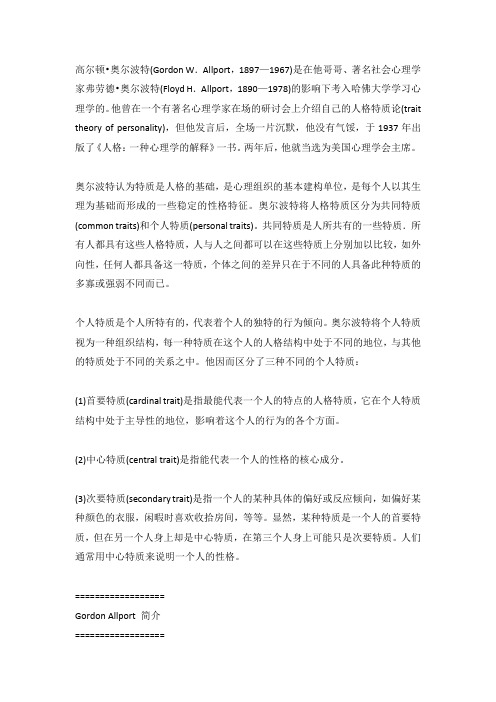
高尔顿•奥尔波特(Gordon W.Allport,1897—1967)是在他哥哥、著名社会心理学家弗劳德•奥尔波特(Floyd H.Allport,1890—1978)的影响下考入哈佛大学学习心理学的。
他曾在一个有著名心理学家在场的研讨会上介绍自己的人格特质论(trait theory of personality),但他发言后,全场一片沉默,他没有气馁,于1937年出版了《人格:一种心理学的解释》一书。
两年后,他就当选为美国心理学会主席。
奥尔波特认为特质是人格的基础,是心理组织的基本建构单位,是每个人以其生理为基础而形成的一些稳定的性格特征。
奥尔波特将人格特质区分为共同特质(common traits)和个人特质(personal traits)。
共同特质是人所共有的一些特质.所有人都具有这些人格特质,人与人之间都可以在这些特质上分别加以比较,如外向性,任何人都具备这一特质,个体之间的差异只在于不同的人具备此种特质的多寡或强弱不同而已。
个人特质是个人所特有的,代表着个人的独特的行为倾向。
奥尔波特将个人特质视为一种组织结构,每一种特质在这个人的人格结构中处于不同的地位,与其他的特质处于不同的关系之中。
他因而区分了三种不同的个人特质:(1)首要特质(cardinal trait)是指最能代表一个人的特点的人格特质,它在个人特质结构中处于主导性的地位,影响着这个人的行为的各个方面。
(2)中心特质(central trait)是指能代表一个人的性格的核心成分。
(3)次要特质(secondary trait)是指一个人的某种具体的偏好或反应倾向,如偏好某种颜色的衣服,闲暇时喜欢收拾房间,等等。
显然,某种特质是一个人的首要特质,但在另一个人身上却是中心特质,在第三个人身上可能只是次要特质。
人们通常用中心特质来说明一个人的性格。
==================Gordon Allport 简介==================地位:人格心理学之父。
the personality potion读后感
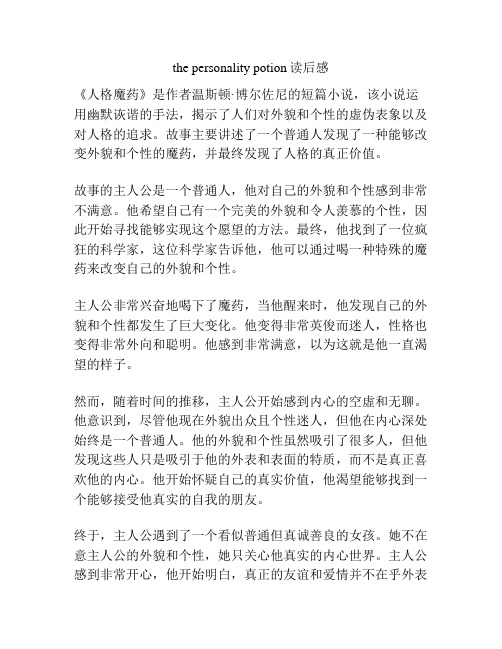
the personality potion读后感《人格魔药》是作者温斯顿·博尔佐尼的短篇小说,该小说运用幽默诙谐的手法,揭示了人们对外貌和个性的虚伪表象以及对人格的追求。
故事主要讲述了一个普通人发现了一种能够改变外貌和个性的魔药,并最终发现了人格的真正价值。
故事的主人公是一个普通人,他对自己的外貌和个性感到非常不满意。
他希望自己有一个完美的外貌和令人羡慕的个性,因此开始寻找能够实现这个愿望的方法。
最终,他找到了一位疯狂的科学家,这位科学家告诉他,他可以通过喝一种特殊的魔药来改变自己的外貌和个性。
主人公非常兴奋地喝下了魔药,当他醒来时,他发现自己的外貌和个性都发生了巨大变化。
他变得非常英俊而迷人,性格也变得非常外向和聪明。
他感到非常满意,以为这就是他一直渴望的样子。
然而,随着时间的推移,主人公开始感到内心的空虚和无聊。
他意识到,尽管他现在外貌出众且个性迷人,但他在内心深处始终是一个普通人。
他的外貌和个性虽然吸引了很多人,但他发现这些人只是吸引于他的外表和表面的特质,而不是真正喜欢他的内心。
他开始怀疑自己的真实价值,他渴望能够找到一个能够接受他真实的自我的朋友。
终于,主人公遇到了一个看似普通但真诚善良的女孩。
她不在意主人公的外貌和个性,她只关心他真实的内心世界。
主人公感到非常开心,他开始明白,真正的友谊和爱情并不在乎外表和个性,而是建立在人格之上。
他意识到,人格才是真正能够吸引他人的特质,而外表和个性只是虚假的表象。
通过这个故事,作者告诉我们,虽然外貌和个性在社交场合中非常重要,但它们不是真正的决定因素。
真正重要的是我们的人格和内心世界。
我们应该努力提升自己的内在品质,使自己成为一个真诚善良的人。
只有这样,我们才能找到真正欣赏我们的人,建立真正的友谊和爱情。
这个故事给我留下了深刻的印象。
在现实生活中,我们经常受到外貌和个性的压力,追求别人对我们的肯定和赞赏。
然而,通过这个故事,我意识到这样的追求是没有意义的。
Analysis of the Characters in Othello 《奥赛罗》中的人物分析

Analysis of the Characters in Othello 《奥赛罗》中的人物分析AcknowledgementsMy study at the Academic English will soon come to an end ,and at the completion of my final thesis; I wish to express my sincere appreciation to all th -ose who have offered me invaluable help during the two years of my college English study.First of all, I would like to extend my sincere gratitude to my Academic English teacher,GuoXi.for her constant encouragement and guidance. She has walked me through all the stages of the writing of this thesis. Without her consistent and illuminating instruction, this thesis could not have reached its present form.Secondly, I should give my hearty thanks to my college.it provided us enormously resources ,let us more convenient to find information.Last my thanks would go to my beloved family for their loving considerations and great confidence in me all through these years. I also owe my sincere gratitude to my friends and my roommates who help me work out my problems during the difficult course of the thesis.【Abstract】 William Shakespeare is considered to be the greatest among the great playwrights that have ever lived,Othello is one of Shakespeare’s four great tragedies.Othello is a new man of the Renaissance,is the first great black protagonist in Western literature, and still one of the most famous. In addition,the vivid contrast of character in this play is striking, such as the Moor Othello,the Gentle Desdemona,the villain Iago,and good-natured Cassio.This paper emphasizes on three major charactes:Othello, Desdemona, and Iago,and it’s mainly focused on Othello.The three characters distinguishing qualities enhance the contradiction and significance of this great tragedy. Othello is a jealous and suspicious leading role,and this weakness of character is used by Iago . The villain Iago premeditatedly spreads the rumor about his wife Desdermona and his friend Cassio.As his jealousy and suspicion, Othello is easily provoked by Iago. Therefore the rumor wr -ecks the happiness of Othello’s life. Desdemona is the incarnation of love and loyalty, she always believed her true love will moved her husband until the last moment of her life.Iago perhaps Shakespeare's most evil figure,he is couse of all the tragedy.In a word, all of this characters give rise to the resulting tragedy.【摘要】威廉莎士比亚被认为是在那些曾经出现的优秀剧作家中最优秀的一个,奥赛罗是莎士比亚四大杰出悲剧之一。
上海市杨浦高级中学2021-2022学年高二下学期期中考试英语试卷
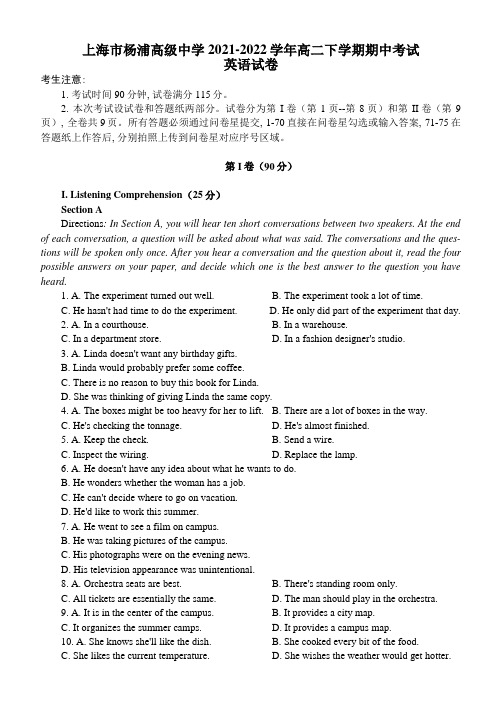
上海市杨浦高级中学2021-2022学年高二下学期期中考试英语试卷考生注意:1. 考试时间90分钟, 试卷满分115分。
2. 本次考试设试卷和答题纸两部分。
试卷分为第I卷(第1页--第8页)和第II卷(第9页), 全卷共9页。
所有答题必须通过问卷星提交, 1-70直接在问卷星勾选或输入答案, 71-75在答题纸上作答后, 分别拍照上传到问卷星对应序号区域。
第I卷(90分)I. Listening Comprehension(25分)Section ADirections: In Section A, you will hear ten short conversations between two speakers. At the end of each conversation, a question will be asked about what was said. The conversations and the ques-tions will be spoken only once. After you hear a conversation and the question about it, read the four possible answers on your paper, and decide which one is the best answer to the question you have heard.1. A. The experiment turned out well. B. The experiment took a lot of time.C. He hasn't had time to do the experiment.D. He only did part of the experiment that day.2. A. In a courthouse. B. In a warehouse.C. In a department store.D. In a fashion designer's studio.3. A. Linda doesn't want any birthday gifts.B. Linda would probably prefer some coffee.C. There is no reason to buy this book for Linda.D. She was thinking of giving Linda the same copy.4. A. The boxes might be too heavy for her to lift. B. There are a lot of boxes in the way.C. He's checking the tonnage.D. He's almost finished.5. A. Keep the check. B. Send a wire.C. Inspect the wiring.D. Replace the lamp.6. A. He doesn't have any idea about what he wants to do.B. He wonders whether the woman has a job.C. He can't decide where to go on vacation.D. He'd like to work this summer.7. A. He went to see a film on campus.B. He was taking pictures of the campus.C. His photographs were on the evening news.D. His television appearance was unintentional.8. A. Orchestra seats are best. B. There's standing room only.C. All tickets are essentially the same.D. The man should play in the orchestra.9. A. It is in the center of the campus. B. It provides a city map.C. It organizes the summer camps.D. It provides a campus map.10. A. She knows she'll like the dish. B. She cooked every bit of the food.C. She likes the current temperature.D. She wishes the weather would get hotter.Section BDirections: In Section B, you will hear two short passages and one longer conversation, and you will be asked several questions on each of the passages and the conversation. The passages and the conversation will be read twice, but the questions will be spoken only once, when you hear a question, read the four possible answers on your paper and decide which one would be the best answer to the question you have heard.Questions 11 through 13 are based on the following passage.11. A. A final copy of the research project. B. Copies of the midterm.C. A textbook and pencils.D. A few pens.12. A. It will include both multiple-choice and essay questions.B. It will include nothing but multiple-choice questions.C. It will include an oral and a written section.D. It will include nothing but essay questions.13. A. It will be easy to understand.B. Students must complete all parts of it.C. It will cover topics from a wide variety of academic fields.D. Students will be tested on all the material discussed in class.Questions 14 through 16 are based on the following passage14. A. They should go through some natural process of decay.B. They should be put into boiling water for a little while.C. They should be preserved by any other method first.D. They should be exposed to air for some time.15. A. To state that blanching is expensive but every effective.B. To show that many people waste food by blanching improperly.C. To warn that not blanching will harm the food's nutritional value.D. To emphasize the importance of blanching only a few times a time.16. A. It eventually causes vegetables to spoil.B. It stops after the vegetables have ripened.C. It preserves the flavor of frozen vegetables.D. It is a necessary step in the blanching process.Questions 17 through 20 are based on the following conversation.17. A. A line drawing. B. An oil painting.C. A wood carving.D. A stone sculpture.18. A. Highly functional. B. Both abstract and realistic.C. Brightly colored.D. Large but lightweight.19. A. The seal. B. The caribou.C. The polar bear.D. The white whale.20. A. White snow. B. Survival skills.C. A tasty food.D. An artist's model.II. Grammar and Vocabulary(20分)Section ADirections: After reading the passage below, fill in the blanks to make the passage coherent and grammatically correct. For the blanks with a given word, fill in each blank with the proper form of the given word; for the other blanks, use one word that best fits each blank.Mini-Biographies Help Clinicians Connect with PatientsBog Hall was recovering from yet another surgery in March 2014 when a volunteer walked into his hospital room.The volunteer wasn't there to check on his lungs or breathing. Instead, she asked Hall(21)___he wanted to tell his life story.The interview was part of a program (22)___(call) My Life, My Story. Volunteer writers seek out veterans (老兵) at the hospital like Hall, and ask them all about their lives. Then they write up a thousand- word biography, and go over it with the patient, (23)_____can add more details or correct any mistakes.When the story is finished, it(24)_____(attach) to the patient's electronic record, where a doctor or nurse(25)_____(work) anywhere in the Veterans Affairs medical system can read it.Today more than 2, 000 patients at the Madison VA(26)_____(share) their life stories.Project organizers say it could change the way providers interact with patients. “(27)___clinicians can access a lot of medical data through a patient's electronic medical record, there's no-where to learn about a patients' personality or learn about his career, passion or values, ” said Thor Ringler, who has managed the My Life, My Story project (28)___2013.(29)____idea for My Life, My Story came from Dr. Elliot Lee, a medical resident who was doing a training programme at the Madison VA in 2012. The typical programme for medical residents lasts only about a year, so Lee wanted to find a way to bring new, young doctors up to speed on the VA patients. He wanted a way for them(30)____(absorb) not just their health histories, but more personal pieces of knowledge.Section BDirections: Fill in each blank with a proper word chosen from the box. Each word can be usedAtishoo, we all fall downFLU season has arrived in the northern half of the planet. That is not news -- it happens every year, and for most of us it is _31__ little more than a nuisance (令人讨厌的事物). But the flu of 2018 could be as bad as an annual winter __32__ gets.You may think you have heard it all before, but you probably haven't. To be clear, we are not talking about bird or swine flu, the kind that keeps virologists awake at night fearing a pandemic (流行疾病). Right now the warnings are about regular winter flu. But it looks like a bad one. For people who are weak because of age, pregnancy, obesity or other risk factors, it could be a(n)__33__.And yet the world __34__ astonishingly uncaring about a virus that regularly kills hundreds of thousands and __35__ more. We defend ourselves against it half-hearted with a vaccine from the 1940s, which is better than nothing -- but we know we can do more. We spend a small amount of money on developing vaccines that will actually defeat it, even though researchers have some very __36__ leads.Why? Partly because of complacency (自满): most of us have flu and lived to tell the tale. Partly because denialists push the lie that the threat is __37__ so medical companies can sell vaccines and drugs. And partly because a better vaccine won't be very profitable.This month also__ 38 __the 100th year of the so-called Spanish flu, the worst pandemic we know about. This year's “Aussie flu” is a later __39__ of that virus. It won't be as bad, but we must hope that its__40__ impact is enough to tell the world that ordinary flu is still a serious disease and that a repeat of 1918 is supposed to happen.III. Reading Comprehension(45分)Section ADirections: For each blank in the following passage there are four words or phrases marked A, B, C and D. Fill in each blank with the word or phrase that best fits the context.The 6th-century dramatist Ben Johnson generously called Shakespeare a writer “not of an age, but for all time. ” And so it has proven to be, for Shakespeare's plays are still the most translated and most __41 __of any playwriter's in the world. But if you ask people what accounts for Shakespeare's __42__ popularity, you will get a number of different answers. Some will say that he was a great sto-ryteller, others that the __43__ lies in the beauty of his poetry. Some scholars point out that he was born in a lively period of England's history, time of great national confidence and cultural activity, par-ticularly in the theatre. __44__, they claim, he was able to produce an extraordinary volume of work.This last explanation seems a little __45_. Amore interesting answer is put forward, although a little over-enthusiastically, by Harold Bloom in his book Shakespeare: The Invention of the Human. Bloom argues that Shakespeare gave us something in his writing that the world had not seen in __46__ before: characters with a strong personality. These lifelike characters gave us a real insight into the human __47__: Iago, the trusted advisor of Othello, whose jealousy leads him to betray his honest master; Rosalind, the heroine in As You Like it, who remains true to her friends and family despite the danger to herself. Through the mouths of such characters, we learn truths about life that we can all __48__ . These truths are made more moving and more memorable by the way in which they are __49 __: briefly and poetically.Shakespeare has been dead almost 400 years, but the words and saying attributed(归功于)to him still __50__ the English language today. So whether you are “fashionable” or “sanctimoni-ous, ”thank Shakespeare, who probably __51__ the terms. In fact, it is amazing just how great Shakespeare's influence on everyday language has been. Take, for example, these phrases from Mi-chael Macrone's light-hearted book Brush Up Your Shakespeare.foregone conclusion seen better daysfull circle the world is (my)oysterat one fell swoop neither here nor thereMacrone is more interested in the Shakespearean language that has survived than the reasons for its __52__. According to his research, some of these sayings are slightly different from their original meaning once taken out of the __53__ of the plays in which they first appeared. For example, “the be all and end all” is used today to mean “the most important thing”, but in Macbeth, it means “the end of the matter”.Regardless of such technicalities, it is still remarkable that so many of Shakespeare's words have survived the large __54__ in language between their time and the present day. The beauty of those words is certainly one reason, but as Johnson suggested, it is the humanity and lasting relevance (相关性; 实用性)of their __55__ that brings them to life.41. A. selected B. performed C. evaluated D. revised42. A. temporary B. varying C. individual D. enduring43. A. magic B. evidence C. creativity D. count44. A. In a word B. As a consequence C. By contrast D. To some degree45. A. possible B. convincing C. unsatisfactory D. annoying46. A. man B. literature C. history D. focus47. A. condition B. emotion C. language D. status48. A. qualify for B. judge from C. specialize in D. identify with49. A. proved B. phrased C. believed D. understood50 A. color B. define C. mask D. involve51. A. honored B. improved C. coined D. chose52. A. significance B. variety C. livelihood D. popularity53. A. concept B. time C. context D. outline54. A. shifts B. conflicts C. similarities D. trends55. A. pronunciation B. wording C. originality D. messageSection BDirections: Read the following passages. Each passage is followed by questions or unfinished statements. For each of them there are four choices marked A, B, C and D. Choose the one that fits best according to the information given in the passage you have just read.(A)I hesitated when the editor in chief of The New York Times Magazine told me in late 2014 that I would be editing a new front-of-book column called “Letter of Recommendation”, about stuff peo-ple really like. The column was the brainchild of our staff writer, Sam Anderson, who figured that there was no shortage of places to find out what writers hate but few spaces for writers to talk about what they love. We would push against this trend, 900 words a week, 40-something times per year.The reason for my hesitation was a simple, unfortunate fact about writing. Writing about things you hate is easy. The criticism tends to entertain, even if you disagree, but the ode doesn't. The writer-ly tone is well-suited to our age, but it's hard not to see it as a collective defense mechanism -- as if re-vealing your true feelings exposes your unmentionable secrets to the public. Fascination, meanwhile, are inseparable from our peculiarities as people -- we come to love things for often strange reasons. When the column really works, it's as revealing about the author as it is its subject. One writer, a manin his late 30s, for example, recommended Pedialyte, which he drinks to balance the effects of both drinking and exercise, and to cheat his way back to youth.I probably see about three to five “Letter of Recommendation” pitches a day. It's a great spot for trying out new writers in the magazine, so I try my best to keep up with all the email, but I often fail. Determining which to assign involves seeing how it meets the various criteria we've settled on over the years. We don't like the column to be timely -- everything else in the world is timely. But on the other hand, we need to put a headline on the thing that people might reasonably recognize, stop and read about. There should be a personal angle to the recommendation, but also some universally rec-ommendable aspect. But then again, it shouldn't be too recommendable; this isn't a column for lifehacks (生活妙招). The recommendation itself should be attractively unexpected, but really, it's just an excuse to cut brilliant writers loose to amuse or inspire us.56. Sam Anderson proposed a column called “Letter of Recommendation” because he found ____.A. the fashion trend was not easy to push againstB. there was a shortage of good quality columnsC. writers could hardly find a place to share their likesD. his brainchild could sometimes increase readership57. The word “ode” in paragraph 2 is closest in meaning to ___.A. praiseB. blameC. hesitationD. determination58. Why is “the writer in his late 30s” mentioned in paragraph 2?A. To give an example of the writerly tone.B. To highlight the way that the column selects writers.C. To show how a collective defense mechanism works.D. To illustrate how writers reveal themselves in the column.59. The writer hopes that in the column, ____.A. the recommended items are quite familiar to readersB. the recommended items should follow the latest trendC. readers can learn about life skills from the recommendationsD. readers will find the recommendations beyond their expectation(B)Nowadays, bikes are getting smarter. Although it may seem confusing to mess with the simplicity of a bicycle, e-bikes are actually the perfect fit for a variety of circumstances, including living in a hilly area, looking for a greener transportation alternative or just to make riding a bike more fun. Here are four typical models of e-bikes.Best for a tight budget: Schwinn Monroe 250Not interested in breaking the bank? Try Schwinn's Monroe 250. It's an urban rider with a single speed and is great for zipping across town or around campus. It lasts up to 50 miles and requires a five-hour battery charge from zero. Plug it in before bed, and you're golden in the morning.Best for the tech-savvy: Specialized Turbo VadoSpecialized's entry-level Turbo Vado 2. 0 comes equipped with a customized touchscreen smart computer. With it, you can control the assist mode and connect through Bluetooth to the Specialized Mission Control app.The app lets you map out your ride, and then the motor will adjust to that specific distance so you never have to worry about the battery dying mid-route. It also offers direction and diagnostics and stores your ride history and personal preferences.Best for all-around use: Cannondale Quick NeoFor those who want a does-it-all option, the Cannondale Quick Neo is your best bet. It was de-signed for people who lead active lifestyles but may not be “cyclists”.The Quick Neo has three assist modes -- eco, normal and high -- and the battery lasts up to 70 miles before it needs a four-hour recharge. It also has front suspension, so it'll handle bumps, pot-holes and even dirt paths well, and its brakes make it easier to stop if the weather gets wet.Best for replacing a car: Trek Super Commuter+If you live in a big city and owning a car is not an option, then the Super Commuter+ could be for you. It's expensive, but less expensive than most cars when you allow for the amount of money you spend on gas, maintenance, insurance, parking or public transportation, an e-bike is a more economical choice for urban citizens looking for a new way to get around.With four assist modes, it can go up to 28 mph and as far as 120 miles on a battery that takes just three to five hours to charge, so it's basically like the Ferrari of e-bikes.60. If you are not an experienced cyclist, which of the following might be your best choice?A. Schwinn Monroe 250.B. Specialized Turbo Vado.C. Cannondale Quick Neo.D. Trek Super Commuter+.61. Which e-bike is most suitable for those who knows much about technology?A. Schwinn Monroe 250.B. Specialized Turbo Vado.C. Cannondale Quick Neo.D. Trek Super Commuter+.62. Which of the following statements is true according to the passage?A. Schwinn Monroe 250 is the most economical choice among the four e-bikes.B. Specialized Turbo Vado allows the doctor give your diagnosis according to the data.C. Cannondale Quick Neo doesn't function as well as expected on rainy days.D. Trek Super Commuter+ need five hours to recharge before it can go 70 miles.(C)In the Pacific Northwest, no tree is as crucial as the Douglas fir, which dominates the region's rainforests. It was the basis of the traditional economy and is still an important source of timber (木材)in plantations around the world. But research now suggests the tree may be threatened with dis-ease and decline, fuelled by a warming climate.The cause is Swiss needle cast (SNC), a fungus (真菌) that grows only on Douglas firs. SNC can live on the tree kindly. Under certain environmental conditions, however, its activity intensi-fies, causing a yellowing and falling of needles that slows growth. In severe cases, it kills the tree.Because our understanding of infection patterns is limited, researchers from the US Environmen-tal Protection Agency and Oregon State University came together to reconstruct the conditions leading to outbreaks. In doing so, they found that the increasingly mild conditions expected with climate change will drive an increase in SNC disease.The team took tree core samples from mature Douglas firs in different forests in Oregon's Coast and Cascade mountain ranges. The growth rings in each core provided years of information, with sharp reductions in growth rate indicating SNC impacts. By combining the information collected from treerings with information on climatic changes, the team found ties between climatic events and the inten-sity of outbreaks.Periods with mild winters and more summer rain led to some of the most extreme SNC impacts. Similar climatic conditions will become more frequent due to climate change.Traditionally, SNC outbreaks have been more common in the mild, coastal fog zone than in the high Cascade peaks, but warming of these inland elevations will invite major outbreaks.The effects of climate change are likely to extend beyond the trees, as they are vital to many ani-mals, such as spotted owls, says David Shaw, a forest biologist at Oregon State University and director of the SNC Cooperative. These threatened birds nest in bigger mature trees like Douglas firs. Slow growth from SNC may reduce nesting opportunities.If, as feared, SNC outbreaks worsen and Douglas fir growth declines, Shaw expects broad and fundamental changes to Pacific Northwest forests, including declining carbon fixation and lower tim-ber harvests.63. Under which of the following conditions will SNC's activity intensify?A. When Douglas firs' needles fall down.B. When it's warm in winter and damp in summer.C. When the temperature varies greatly in a day.D. When the fungi living on Douglas firs gets infected.64. Which of the following reveals SNC impacts?A. Douglas firs' slow growth.B. Douglas firs' getting mature.C. Douglas firs' decreasing rings.D. Douglas firs' change in colour.65. Which of the following can be inferred from the passage about SNC outbreaks?A. Their influence took a long time to appear.B. They used to be ignored by some biologists.C. Their frequency had nothing to do with other creatures.D. They used to be less common in the high Cascade peaks.66. The last two paragraphs talk mainly aboutA. possible chain reactions due to SNC outbreaksB. future changes in the climate all over the worldC. ways to deal with the threats caused by global warmingD. animals that may be affected by declining nesting opportunitiesSection CDirections: Read the passage carefully. Fill in each blank with a proper sentence given in the box. Each sentence can be used only once. Note that there are two more sentences than you need.Volcanoes in Indonesia“The hardest bit of the job is having enough sleep, ” admits Martanto, a 29-year-old geophysi-cist at the monitoring centre for Agung, a volcano in Bali which started erupting (爆发)on Novem-ber 25th. For the past two weeks he and half a dozen others have relocated from Bandung, in West Ja-va, to keep watch on Agung every hour of the day, occasionally in continuous 32-hour shifts.____67___It was home to both the biggest eruption of modern times, that of Tambora in 1815, and the sec-ond-biggest, of Krakatoa in 1883. Agung's previous eruption, in 1963. was the most explosive of the 20th century in Indonesia. Gas, rock and ash were ejected to a height of 25km above the crater (火山口). More than 1, 000 people died. Previous eruptions, in 1843 and 1710-11, were similarly destruc-tive. says Devy Kamil Syahbana of the Volcanology and Geological Disaster Mitigation Centre (PVMBG) in Bandung.___68___The first, of which there are 69, are active volcanoes which have erupted at least once since 1600. The second are active but have not erupted since 1600. The third are potentially active openings in the earth's crust, such as fumaroles. The first type, of which Agung is one, are monitored 24 hours a day by an observer in a station nearby, from which they can see the peak. They then feedback information to the main centre in Bandung.Eruptions, in short, are hard to predict with precision. Sinabung, on the island of Sumatra, erupted suddenly in 2010 and then again in 2013 and 2016. ___69___As a result, PVMBG had not been moni-toring it, and those living nearby were not prepared to evacuate. It is still erupting; thousands of people have had to be permanently relocated.Even when volcanoes are known to be active, and there are enough monitoring data, it is not easy to judge how destructive an eruption might be. ___70___Call for an evacuation too early, and people might decide the risk is overblown and return to their homes.第II卷(25分)IV. Summary(10分)Directions: Read the following passage. Summarize the main idea and the main point(s) of the passage in no more than 60 words. Use your own words as far as possible.71. Television is doing irreparable harmTelevision hasn't been with us all that long, but we are already beginning to forget what the world was like without it. Before we admitted the one-eyed monster into our homes, we never found it diffi-cult to occupy our spare time. We used to enjoy civilized pleasures. For instance, we used to have hobbies, we used to entertain our friends and be entertained by them, we used to go outside for our amusements to theatres, cinemas, restaurants and sporting events. We even used to read books and lis-ten to music and broadcast talks occasionally. All that belongs to the past. Now all our free time is regulated by the television. We rush home or have our meals quickly to be in time for this or that pro-gramme. We have even given up sitting at table and having a leisurely evening meal, exchanging thenews of the day. A sandwich and a glass of beer will do anything, providing it doesn't interfere with the programme.There is a limit to the amount of creative talent available in the world. Every day, television con-sumes vast quantities of creative work. That is why most of the programmers are so bad: it is impossi-ble to keep pace with the demand and maintain high standards as well. When millions watch the same programmers, the whole became a village.Television encourages passive enjoyment. We become satisfied with second-hand experiences. It is so easy to sit in our armchairs watching others working. Little by little, television cuts us off from the real world. Television may be a splendid medium of communication, but it prevents us from com-municating with each other. We only become aware how totally irrelevant television is to real living when we spend a holiday by the sea or in the mountains, far away from civilization. In quiet, natural surroundings, we quickly discover how little we miss the television.V. Translation(15分)Directions: Translate the following sentences into English, using the words given in the brackets.72. 在他看来, 值得投资的是体验, 而不是物品。
《Othello》人物性格研究现状综述
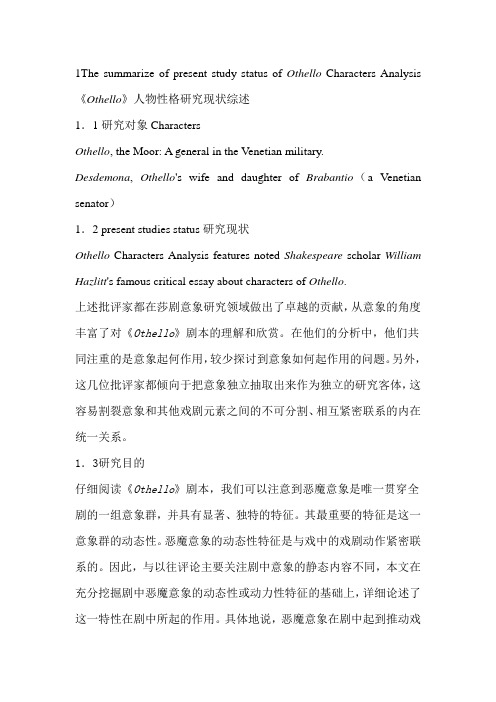
1The summarize of present study status of Othello Characters Analysis 《Othello》人物性格研究现状综述1.1研究对象CharactersOthello, the Moor: A general in the Venetian military.Desdemona, Othello's wife and daughter of Brabantio(a Venetian senator)1.2 present studies status研究现状Othello Characters Analysis features noted Shakespeare scholar William Hazlitt's famous critical essay about characters of Othello.上述批评家都在莎剧意象研究领域做出了卓越的贡献,从意象的角度丰富了对《Othello》剧本的理解和欣赏。
在他们的分析中,他们共同注重的是意象起何作用,较少探讨到意象如何起作用的问题。
另外,这几位批评家都倾向于把意象独立抽取出来作为独立的研究客体,这容易割裂意象和其他戏剧元素之间的不可分割、相互紧密联系的内在统一关系。
1.3研究目的仔细阅读《Othello》剧本,我们可以注意到恶魔意象是唯一贯穿全剧的一组意象群,并具有显著、独特的特征。
其最重要的特征是这一意象群的动态性。
恶魔意象的动态性特征是与戏中的戏剧动作紧密联系的。
因此,与以往评论主要关注剧中意象的静态内容不同,本文在充分挖掘剧中恶魔意象的动态性或动力性特征的基础上,详细论述了这一特性在剧中所起的作用。
具体地说,恶魔意象在剧中起到推动戏剧动作的发展、引起并加剧戏剧冲突,以及推动其达到高潮的作用。
它的作用模式主要表现在依阿哥这一恶魔意象主体使用恶魔意象作用于布罗班修、洛德里高和Othello,并引起他们的心理变化以及外部行为的变化。
the personality potion读后感
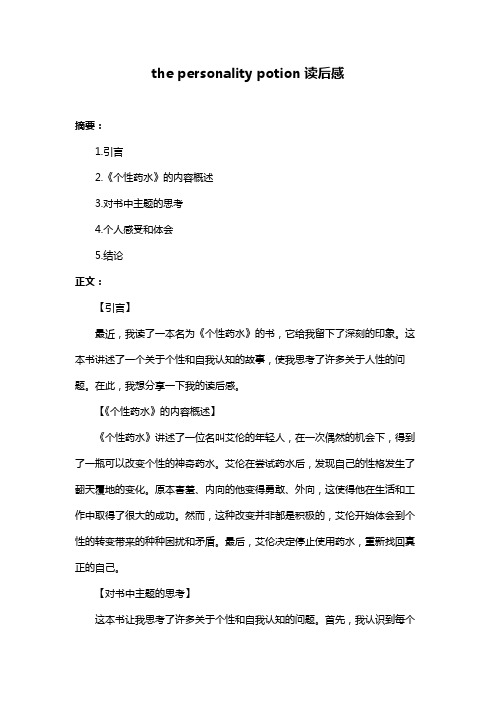
the personality potion读后感摘要:1.引言2.《个性药水》的内容概述3.对书中主题的思考4.个人感受和体会5.结论正文:【引言】最近,我读了一本名为《个性药水》的书,它给我留下了深刻的印象。
这本书讲述了一个关于个性和自我认知的故事,使我思考了许多关于人性的问题。
在此,我想分享一下我的读后感。
【《个性药水》的内容概述】《个性药水》讲述了一位名叫艾伦的年轻人,在一次偶然的机会下,得到了一瓶可以改变个性的神奇药水。
艾伦在尝试药水后,发现自己的性格发生了翻天覆地的变化。
原本害羞、内向的他变得勇敢、外向,这使得他在生活和工作中取得了很大的成功。
然而,这种改变并非都是积极的,艾伦开始体会到个性的转变带来的种种困扰和矛盾。
最后,艾伦决定停止使用药水,重新找回真正的自己。
【对书中主题的思考】这本书让我思考了许多关于个性和自我认知的问题。
首先,我认识到每个人都有自己独特的个性,这是人类多样性的体现。
在这个世界上,没有人是完美的,每个人都有自己的优点和缺点。
我们应该学会接受自己的不足,努力提高自己,而不是试图改变自己的本质。
此外,自我认知也是一个很重要的过程。
我们应该了解自己的优点和缺点,这样才能找到真正适合自己的道路,实现自己的价值。
【个人感受和体会】读完这本书,我对个性和自我认知有了更深的理解。
我也意识到,在这个快节奏的社会中,我们很容易被外界的影响所左右,试图改变自己以适应所谓的“成功模式”。
然而,《个性药水》提醒我们要珍视自己的独特性,勇敢地做自己。
同时,我们也要学会自我认知,找到自己的优势和劣势,不断地提高和完善自己。
【结论】总之,《个性药水》是一本很有启发性的书籍。
它让我思考了关于个性、自我认知和人性等问题,让我更加珍视自己的独特性,勇敢地做自己。
中考英语戏剧解读单选题80题
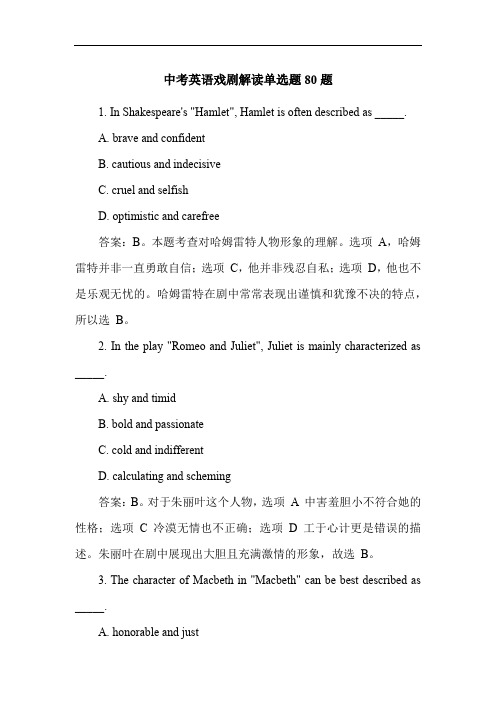
中考英语戏剧解读单选题80题1. In Shakespeare's "Hamlet", Hamlet is often described as _____.A. brave and confidentB. cautious and indecisiveC. cruel and selfishD. optimistic and carefree答案:B。
本题考查对哈姆雷特人物形象的理解。
选项A,哈姆雷特并非一直勇敢自信;选项C,他并非残忍自私;选项D,他也不是乐观无忧的。
哈姆雷特在剧中常常表现出谨慎和犹豫不决的特点,所以选B。
2. In the play "Romeo and Juliet", Juliet is mainly characterized as _____.A. shy and timidB. bold and passionateC. cold and indifferentD. calculating and scheming答案:B。
对于朱丽叶这个人物,选项A 中害羞胆小不符合她的性格;选项 C 冷漠无情也不正确;选项 D 工于心计更是错误的描述。
朱丽叶在剧中展现出大胆且充满激情的形象,故选B。
3. The character of Macbeth in "Macbeth" can be best described as _____.A. honorable and justB. ambitious and ruthlessC. kind-hearted and generousD. simple-minded and naive答案:B。
在《 麦克白》中,麦克白的特点。
选项 A 正直公正与他不符;选项 C 善良慷慨并非他的特质;选项 D 头脑简单天真也不正确。
麦克白野心勃勃且冷酷无情,所以答案是B。
4. In the drama "Othello", Othello is typically regarded as _____.A. trusting and gullibleB. suspicious and distrustfulC. intelligent and perceptiveD. proud and arrogant答案:A。
浅析奥赛罗悲剧成因

浅析奥赛罗悲剧成因《奥赛罗》中最大的悲剧就是奥赛罗夫妇的死亡。
我们可以从多个方面来分析这个问题的成因。
外在因素是社会各阶层的种族歧视,这是促成奥赛罗悲剧命运的社会因素;内在因素是奥赛罗自身的性格缺陷。
可以说,构成奥赛罗悲剧的原因是复杂的多方面的,是内在原因和外在原因交互交织相互作用的结果。
关键词奥赛罗悲剧性格特点种族歧视其他因素AbstractThe biggest tragedy in Othello is the death of couples. we can analyze the cause of the problem from several aspects . External factors is racial discrimination , this is contributing to Othello tragic fate of the social factors; Intrinsic factor is Othello's own character flaws. This is the formation of Othello tragic fate of its own factors. Constitute the cause of the tragedy of Othello is various. Othello tragic fate is the internal cause and external cause interaction interweave the result of the interaction.KeywordsOthello,Tragedy,Personality traits,Racial discrimination,other factors浅析奥赛罗悲剧成因《奥赛罗》与《哈姆雷特》、《李尔王》、《麦克白》是莎士比亚经典的四大悲剧,但《奥赛罗》并没有描述皇室贵族的纠纷动荡而是描写了奥赛罗和苔丝狄蒙娜之间的感情过程。
othello人物简介(英语)

Roderigo
suitor
Montano
predecessor
Othello
wife
Desdemona
father
Brabantio
Bianca
mistress
Cassio
introductions
charactersຫໍສະໝຸດ relationships
introductions
1 2 3
Othello This play’s protagonist and hero. Othello is the highly respected general of the armies of Venice, although he is not a native of Venice but rather a Moor, or North African. He is an eloquent(有口才的) and powerful figure, respected by all those around him. In spite of his high status, Othello is nevertheless easy prey to insecurities because of his age, his life as a soldier, and his self-consciousness about being a racial and cultural outsider. He possesses a free and open nature that his ensign Iago exploits(利用) to twist Othello’s love for his wife, Desdemona, into a powerful and destructive(毁灭性的) jealousy.
《奥瑟罗》的悲剧主人公——奥瑟罗-汉语言文学-毕业论文
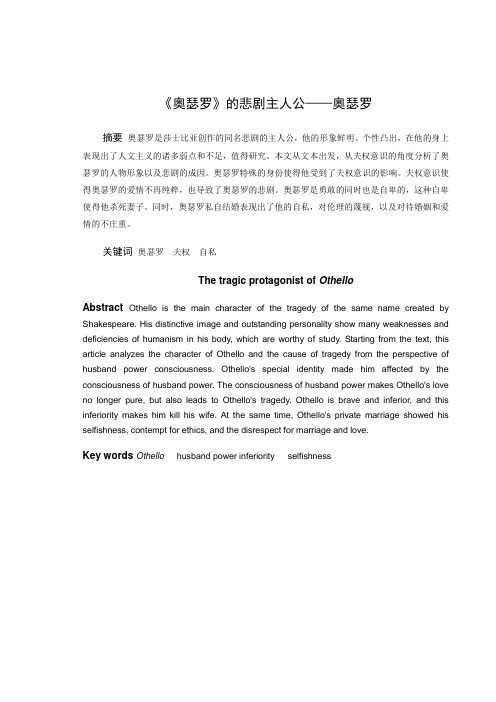
《奥瑟罗》的悲剧主人公——奥瑟罗摘要奥瑟罗是莎士比亚创作的同名悲剧的主人公,他的形象鲜明、个性凸出,在他的身上表现出了人文主义的诸多弱点和不足,值得研究。
本文从文本出发,从夫权意识的角度分析了奥瑟罗的人物形象以及悲剧的成因。
奥瑟罗特殊的身份使得他受到了夫权意识的影响。
夫权意识使得奥瑟罗的爱情不再纯粹,也导致了奥瑟罗的悲剧。
奥瑟罗是勇敢的同时也是自卑的,这种自卑使得他杀死妻子。
同时,奥瑟罗私自结婚表现出了他的自私,对伦理的蔑视,以及对待婚姻和爱情的不庄重。
关键词奥瑟罗夫权自私The tragic protagonist of OthelloAbstract Othello is the main character of the tragedy of the same name created by Shakespeare. His distinctive image and outstanding personality show many weaknesses and deficiencies of humanism in his body, which are worthy of study. Starting from the text, this article analyzes the character of Othello and the cause of tragedy from the perspective of husband power consciousness. Othello's special identity made him affected by the consciousness of husband power. The consciousness of husband power makes Othello's love no longer pure, but also leads to Othello's tragedy. Othello is brave and inferior, and this inferiority makes him kill his wife. At the same time, Othello's private marriage showed his selfishness, contempt for ethics, and the disrespect for marriage and love.Key words Othello husband power inferiority selfishness目录引言 (1)一、奥瑟罗的种族与夫权意识 (1)(一)奥瑟罗的种族 (1)(二)夫权意识下奥瑟罗的高贵解体 (2)(三)夫权意识下苔丝狄蒙娜的屈从 (3)二、奥瑟罗的勇猛与自卑 (4)(一)奥瑟罗的勇猛——赫赫战功 (4)(二)奥瑟罗的自卑 (5)三、奥瑟罗处理结婚方式与蔑视伦理——对婚姻爱情的态度 (6)(一)奥瑟罗的爱情 (6)(二)奥瑟罗的秘密结婚——否定婚姻的庄重性 (6)(三)勃拉班修之死——奥瑟罗的自私 (7)结论 (8)参考文献 (9)致谢 (10)引言《奥瑟罗》是莎翁1604年创作的一部世界闻名的悲剧,该书主要讲述了同名主人公奥瑟罗杀妻并自杀。
othello奥赛罗
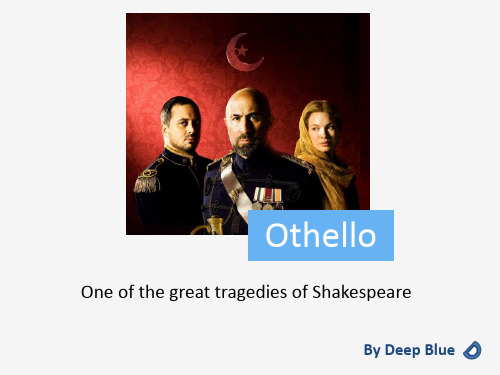
Othello_1884_Poster
Plot
Meanwhile, Iago’s wife Emilia has found a handkerchief dropped by Desdemona. Othello had given it to his wife as a gift. When Emilia shows it to Iago, he snatches it away and then plants the handkerchief in Cassio’s room. When Othello asks his wife for the handerchief and she cannot produce it, Othello becomes convinced that she gave it to Cassio and has been having affair with him.
Greed
Analysis
In Shakespeare's play, Iago's obsession for power and control cause him to lie and trick Othello into questioning his wife's love. If Othello weren‘t obsessed with his love for Desdemona, his mind would not unravel so easily. If Iago weren't so obsessed with power and control, then he wouldn't have to result to lies and deception. Both of these characters have been driven to act in unrational ways because of their obsessions.
Othello’sDescent
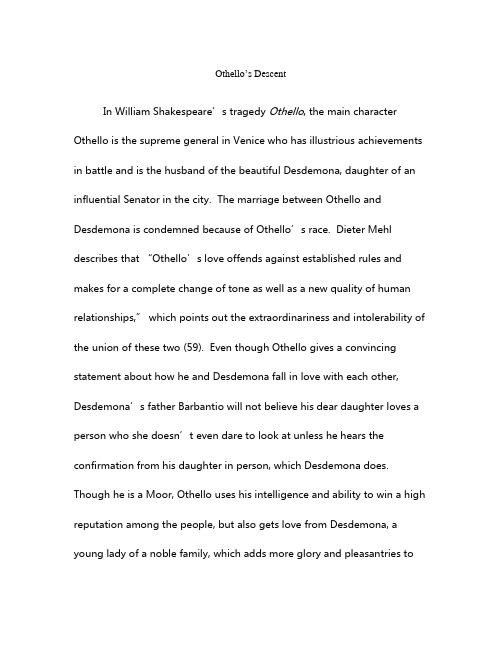
Othello’s DescentIn William Shakespeare’s tragedy Othello, the main character Othello is the supreme general in Venice who has illustrious achievements in battle and is the husband of the beautiful Desdemona, daughter of an influential Senator in the city. The marriage between Othello and Desdemona is condemned because of Othello’s race. Dieter Mehl describes that “Othello’s love offends against established rules and makes for a complete change of tone as well as a new quality of human relationships,” which points out the extraordinariness and intolerability of the union of these two (59). Even though Othello gives a convincing statement about how he and Desdemona fall in love with each other, Desdemona’s father Barbantio will not believe his dear daughter loves a person who she doesn’t even dare to look at unless he hears the confirmation from his daughter in person, which Desdemona does. Though he is a Moor, Othello uses his intelligence and ability to win a high reputation among the people, but also gets love from Desdemona, a young lady of a noble family, which adds more glory and pleasantries tohis life. Unfortunately, Othello’s peaceful and blissful life is smashed by Iago who is resentful to everyone around him. Iago was skillful in making good observations of people and taking advantage of their weaknesses. However, Iago’s activities are not the only reason that causes the tragedy of Othello finally killing his love Desdemona and also himself. His nature of being trustful, passionate and imaginative also leads to this ending. Besides, as an outsider of the city, Othello has little knowledge of how the European women behave, even including his newly-married lady Desdemona. Iago is conscious of this weakness in Othello and exploits this point to make him suspect his wife Desdemo na’s faithfulness. Andrew Bradley claims that “Iago’s plot is Iago’s character in action; and it is built on his knowledge of Othello’s character, and could not otherwise have succeeded,” which shows the essentiality of Iago role in this tragedy (152). A culmination of Othello’s innate qualities and the ability of Iago to manipulate them in negative ways that allow him become engulfed with jealousy and self-hate, which combined to create distrust of Desdemona and by extension, the purpose of his life.Trustfulness is both Othello’s good quality and his weakness as he accepts Iago to be the “honest” person and allows him to take advantage of his faith. Bradley asserts that Othello “shares a great openness and trustfulness of nature,” which mean s he trusts who he thinks is honest without doubt (162). Iago goes about building up his trust from Othello throughout the play because he realizes that “the Moor is of a free and open nature,/ That thinks men honest that but seem to be so,/ And will as tenderly be led by the nose/ As asses are” (1.3.381-4). Once Iago gains Othello’s trust, he could easily manipulate him to think or do what he expects him to, which shows a sufficient possibility that Othello could change from a person who trusts his wife with his life to a person fully convinced that she is betraying him only because of the one-side words from Iago. Labeling Iago as an honest person, Othello is particularly easy to be deceived by deliberate Iago like the blind “ass” being led by the “nose” as Iago scorns in the play. Othello’s full trust of a person reflects another feature of himself which is that he wants everything clear and definite. He would rather fully trust or distrust a person rather than being ambiguous whether to trust or not.To fully understand Othello’s attitude toward uncertainty, Bradley makes the comparison the amazingly self-controlled Othello in front of the furious Barbantio with the passionate Othello reacting to Cassio and Roderigo’s unwarranted brawl can testify to (162). After learning that his daughter married the Moor, Barbantio brings a troop to arrest Othello for enchanting Desdemona. Facing the hostile comers, Othello shows a remarkably composed posture saying “keep up your bright swords, for the dew will rust them” to stop the instant fight (1.2.59). Also, Othello is being patient and decent even while Barbantio charges him of using cunning witchcraft to temp his obedient daughter. However, such a self-controlled man loses his calm when uncertainty exists. During the celebration party for both the repulse of the Turkish fleet and the bridal of Othello and Desdemona, Iago motivates Roderigo, the wealthy pursuer of Desdemona, to irritate the lieutenant Cassio to produce a chaos. Iago’s intrigue successfully inflames the Moor. After a couple of interrogations on how this fight happened, Othello loses his patience and becomes fiery and irrational which drives him to dismiss his lieutenant immediately. Before exploring further Othello’s tolerance of uncertainty, it is necessary tomention his capability of imagination. In Act One when Othello is trying to defend himself, he gives a vivid description about his extraordinary and unusual past life. His adventures enable him to produce infinite imagination because he has undergone and experienced things that other people could never have thought of. Happiness could be enlarged by the imagination while evilness could also expand at the same time, which gives him sufficient room to exaggerate Iago’s vague words.If Othello’s nature of being imaginative causes him to inflate equivocal statements, his passion’s release is how he reacts to his absurd imaginary thoughts that are derived from Iago’s words.Othello is an impassioned perso n who “once wrought to passion, likely to act with little reflection, with no delay, and in the most decisive manner conceivable” (Bradley 159). Othello tends to be less rational and patient when he is furious and he will desperately seek relief by doing extreme things. Bradley also reveals that “emotion excites his imagination, but it confuses and dulls his intellect,” which combines Othello’s imaginative and passionate natures and confirms thatuncertainty animates imagination and passion blinds his mind to judge right or wrong (162). Owning these dispositions could possibly make Othello a time bomb while Iago is the very person who lights up the danger which indicates that explosion becomes a problem of time. Mehl expose s that Iago’s most valuable strategy to destroy his enemies is to exploit “their most admirable qualities,” which is why he designated Othello as the victim on which to carry out Iago’s schemes of aiming at the frailties (65).Iago Indeed?Othello Indee d? Ay, indeed. Discern’st thou aught in that?Is he not honest?Iago Honest, my lord?Othello Honest? Ay, honest.Iago My lord, for aught I know.Othello What dost thou think?Iago Think, my lord?Othello Think, my lord! By heaven, he echoes me,As if there were some monster in his thoughtToo hideous to be shown.(3.3.100-107)Iago applies a series of repetition of Othello’s words to evoke his curiosity and consume his patience: indeed, honest and think. Iago eventually wants to stimulate Othello’s malleable imagination and he succeeds because it is Othello “who actively makes the association between the words Iago repeats and the threatening thought behind them” (Krisch 63). Iago reminds Othello of the danger of jealousy that is a “green-eye monster which doth mock/ The meat it feeds on,” which means that jealousy is a freak that sees things biasedly with its only eyeand people who are jealous will be easily fooled by it (3.3.167-69). A maliciously “sincere” notice is unconsciously planted in Othello’s mind. Othello gives the following reply to Iago’s jealousy theory:I’ll see before I doubt; when I doubt, prove;And on the prove, there is no more but this:Away at once with love or jealousy!(3.3.191-4)As if feeling relieved, Iago then says to “look to your wife, observe her well with Cassio; Wear your eyes thus: not jealous, nor secure” ------ again emphasizes jealousy ------ because “I would not have you r free and noble nature,/ Out of self-bounty, be abused” (3.3.199-202). By saying so, Iago not only delivers his desired message about Desdemona’s unfaithfulness to Othello, but more importantly, he successfully enforces his credibility and loyalty by frankly speaking his thoughts to prevent malicious use of Othello’s goodness, which is taken advantage of by Iago with an identity of “honest” person. Furthermore, Iago persuades in the position of an honest native friend who is familiar with the civilization and customs of the city:I know our country disposition well:In Venice they do let God see that pranksThey dare not show their husbands. Their best conscienceIs not to leave’t undone, but keep’t unknown.(3.3.202-6)By saying “I know our country disposition well,” Iago is passing an implication to Othello that you are not from our country and you know little about it, which gradually encourages insecure feelings of being an outsider and again inspires his fancy imagination. Mehl suggests that Othello is “totally ignorant of the thoughts and the customary morality of Venetian women,” not even his “newly married” wife (164-165). To a man who is addicted to the glory and delight brought by this marriage, Othello treats Desdemona as heaven that is superior and beyond all doubt. She is the soul of virtue in Othello’s eye and that is why he says that “if she be false, oh then Heaven m ocks itself” (3.3.280). Othello’s absolute love to Desdemona makes Iago’s scheme not merely “an exaggerated claim or an unrealistic pose,” but rather a corruption of “an ideal on which Othello has staked his entire existence” (Mehl 67). Iago is attacking Othello’s belief by pointing out his inexperience to the society within Venice. If Desdemona is the kind of the women Iago suspects, Othello then becomes the foolish happy “cuckold” who entirely has faith in his immoral other half. As the poison vague words inject into the Moor’s mind, his submerged instability mixed up with fancy imagination starts toact in his body: “I swear ‘tis better to be much abused than but to know’t a little” and “farewell! Othello’s occupation’s gone”(3.3.336-7/358). His passion occupies his calm driving him to seek for relief, the “ocular proof:”Make me to see’t; or, at the least, so prove itThat the probation bear no hinge nor loopTo hang a doubt on – or woe upon thy life!(3.3.365-7)Othello is urging and threatening Iago to show him the visual proof to satisfy “his fierce desire for certainty and stability” (Stockholder 256). Iago continues his sinful lies to heat up Othello’s emotion by making up some indecent dialogue between Desdemona and Cassio when he is sleeping. The irrationally fervent Othello just absorbs everything from Iago’s evil mouth and reacts with more passion and less doubt as Iago expects. Still, Othello is not entirely satisfied as he wants visual evidenceof her mi sdeeds. The opportunity for this comes when Iago’s wife comes across a handkerchief which happened to be the first gift from Othello to his wife. Once he received it and realized its meaning, Iago saw the chanceto create conflict by leaving the handkerchief in Cassio’s bedroom. He then tells Othello that he saw Cassio used the handkerchief. With little suspicion, Othello asks his wife to show it to him and when she is unableto having lost it), this is the perfect scenario to finally reveal chaotic Othello the “ocular proof” he was asking for. All the uncertainty is gone because Othello has been totally convinced that Desdemona is being adulterous with Cassio. His love, to which he has stakes with his whole life, vanishes since as John Arthos puts it, there is the “violation of love” which is also abuse of his “humanity” (94). In another analysis of these events, Kenneth Gross talks about Iago’s “empty and seductive mode of ‘confusion’” and how it finds its way into “Othello’s clear picture”(827). With his sense of trust put into question, he is distraught and dazed. Iago takes the opportunity to make clear what he wants the truth to be and that is what the handkerchief does.The final act of murder was a culmination of the impressions that Othello was lead to believe. His views of her were shattered but there was more. Internally, he came to believe that he was indeed an outsider. Arthur Kirsch states that Othello “sees himself with Iago’s eyes…with thenexus of his vulnerability being his age and color” (66-67). Kirsch argues that Othello’s faith in his wife disappears “because he becomes convinced that he himself is unlovable” and he becomes consumed with a “despairing self-hatred” and this is where his jealousy comes from (67-68). What follows is his violent rage in which he is both the murder and the victim. Having seen his life’s meaning being taken away with his own acts, the cycle of misery is complete with the decision to commit suicide.In the case of Othello, his devout passion for Desdemona eventually drives him into madness. His trust in her made him an irreplaceable part of his life. Unfortunately, the extended trust he placed in Iago and the “evidence” of his wife’s unfaithfulness infringed on th eir bond. I ago’s emphasis on him being an outsider to the culture of Venice also adds to the possibilities he creates within his imagination. Edward Berry, in his article on the role of race in the play, argues that “Othello’s lack of cultural identity,” and also “h is failure to achieve a true sense of personal identity” are key aspects of the tragedy (323). At that point his sense of control over the situation is gone. His imagination proves to be one of his greatest vulnerabilities and his passions are thereafter projected in thetragic events that take place. As Melh puts it, the “d isillusion is only the product of a slanderer’s art and the Moor’s own imagination” (72). It was a finely crafted plan that took advantage of Othello’s finer qualities and turned them against him. His very natures are not only the components to accomplish a noble man, but also sharp weapons to be used by craft villain to destroy what he has achieved and gained. Othello is “the pitiful victim of Iago’s diabolic cunning” (Mehl 65-66). In the end, it may be that Iago knew Othello better than Othello himself. Even someone as accomplished as Othello was made weak simply by having the nuances of his relationships exploited. The relationship between Othello and his wife was fractured with allusions to her supposedly sinful ways. This was accompanied by a reworked image of his place in Venetian society and finally the view of himself. Together the three redefined him as an outsider, eliminated his general sense of trust, and only to be replaced by the hateful jealousy that consumed and projected his passion. Everything that he knows and loves has betrayed him and so the tragedy is complete even before he takes his own life, which makes killing himself becomes his only choice and relief.Cited PageArthos, John. “The Fall of Othello”. Folger Shakespeare Library and George WashingtonUniversity, 1958. Print.87Berry, Edward. “Othello’s Alienation”. Studies in English Literature. Rice University,1990. Print.Gross, Kenneth. “Slander and Skepticism in Othello”. The Johns Hopkins UniversityPress, 1989. Print.Krisch, Arthur. “The Passions of Shakespeare’s Tragic Heroes”. Charlottesville andLondon: University Press of Virginia, 1990. Print.Mehl, Dieter. “The ‘Great’ Tragedies: Othello”. Shakespeare’s Tragedies:AnIntroduction. New York: the Press Syndicate of the University of Cambridge,1986. Print.Stockholder Katherine. Egregiously an Ass: Chance and Accident in Othello. RiceUniversity, 1973. Print.。
雾都孤儿人物性格
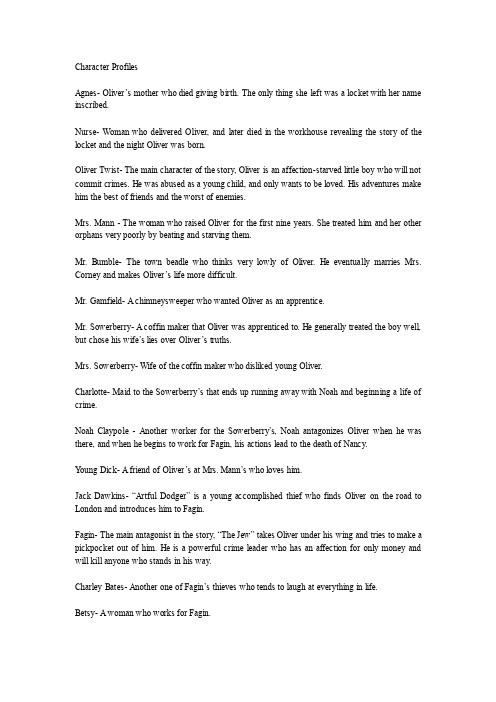
Character ProfilesAgnes- Oliver’s mother who died giving birth. The only thing she left was a locket with her name inscribed.Nurse- Woman who delivered Oliver, and later died in the workhouse revealing the story of the locket and the night Oliver was born.Oliver Twist- The main character of the story, Oliver is an affection-starved little boy who will not commit crimes. He was abused as a young child, and only wants to be loved. His adventures make him the best of friends and the worst of enemies.Mrs. Mann - The woman who raised Oliver for the first nine years. She treated him and her other orphans very poorly by beating and starving them.Mr. Bumble- The town beadle who thinks very lowly of Oliver. He eventually marries Mrs. Corney and makes O liver’s life more difficult.Mr. Gamfield- A chimneysweeper who wanted Oliver as an apprentice.Mr. Sowerberry- A coffin maker that Oliver was apprenticed to. He generally treated the boy well, but chose his wife’s lies over Oliver’s truths.Mrs. Sowerberry- Wife of the coffin maker who disliked young Oliver.Charlotte- Maid to the Sowerberry’s that ends up running away with Noah and beginning a life of crime.Noah Claypole - Another worker for the Sowerberry’s, Noah antagonizes Oliver when he was there, and when he begins to work for Fagin, his actions lead to the death of Nancy.Y oung Dick- A friend of Oliver’s at Mrs. Mann’s who loves him.Jack Dawkins- “Artful Dodger” is a young accomplished thief who finds Oliver on the road to London and introduces him to Fagin.Fagin- The main antagonist in the story, “The Jew” takes Oliver under his wing and tries to make a pickpocket out of him. He is a powerful crime leader who has an affection for only money and will kill anyone who stands in his way.Charley Bates- Another one of Fagin’s thieves who tends to laugh at everything in life.Betsy- A woman who works for Fagin.Nancy- A woman who works for Fagin and tries to help Oliver which eventually leads to her death. She is passionate, caring, and loves Sikes, who eventually kills her.Mr. Brownlow- A man who Oliver’s thief friends rob on the street. He takes Oliver in, and discovers his true parentage.Mrs. Bedwin- Mr. Brownlow’s housekeeper who nurses Oliver back to health.Mr. Grimwig- A friend of Mr. Brownlow who is very cynical of the boy but eventually helps to keep him safe.Mr. Sikes - Another evil character who is a member of Fagin’s gang. He has a little white dog that follows him everywhere. He threatens Oliver and reluctantly leaves him to die in a field after the boy was shot. He kills Nancy in a rage, and eventually kills himself.Tom Chitling- Another petty thief of Fagin’sToby Crackit- A “flash” man who helps Sikes attempt to commit the robbery.Barney- A thief who helps Sikes.Mrs. Corney/ Mrs. Bumble- The matron of the workhouse Oliver was born in who eventually marries Mr. Brumble and here’s the confession of the nurse on her deathbed. She finds the evidence of Oliver’s parentage, and sells it to Monks.Giles- The butler of the Maylie household, he is the man who shot Oliver.Brittles- The “boy” of the Maylie household who was also there the night Oliver was shot.Rose Maylie- The adopted niece of Mrs. Maylie who turns out to be Oliver’s Aunt. She is kind, loving, and a great joy in Oliver’s life.Mrs. Maylie- An old woman who accepts Oliver into her home and finally gives him a loving atmosphere to live in.Mr. Losberne - The doctor and friend of Mrs. Maylie who helps Oliver in his adventures. He is impatient and earnest, but also happy and kindhearted.Blathers Duff- The two Bow Street Runners who come to investigate the attempted robbery. They are filled with stories to tell, and are suspicious of Oliver.Harry Maylie- The son of Mrs. Maylie, Harry is deeply in love with Rose and would do anything to marry her. He befriends Oliver and adds to the boy’s loving atmosphere.Monks/ Edward Leeford- Oliver’s older half brother who does not want to split his inheritance with the bastard child. He destroy s the evidence of Oliver’s mother, and is a cohort of Fagin and his gang。
Othello
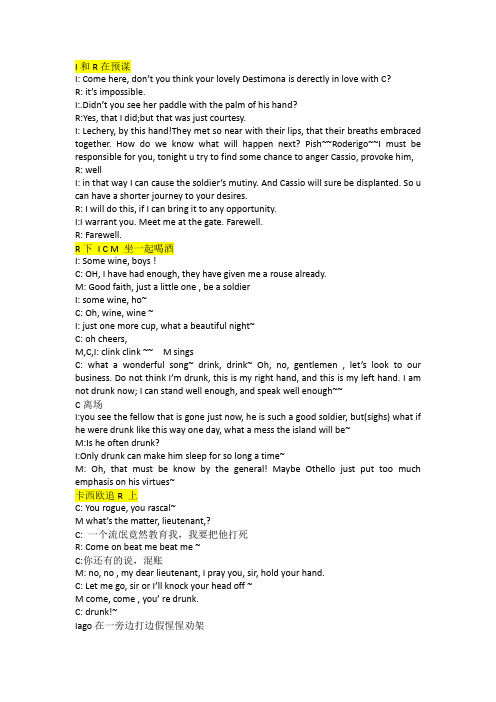
I和R在预谋I: Come here, don’t you think your lovely Destimona is derectly in love with C?R: it’s impossible.I:.Didn’t you see her paddle with the palm of his hand?R:Yes, that I did;but that was just courtesy.I: Lechery, by this hand!They met so near with their lips, that their breaths embraced together. How do we know what will happen next? Pish~~Roderigo~~I must be responsible for you, tonight u try to find some chance to anger Cassio, provoke him, R: wellI: in that way I can cause the soldier’s mutiny. And Cassio will sure be displanted. So u can have a shorter journey to your desires.R: I will do this, if I can bring it to any opportunity.I:I warrant you. Meet me at the gate. Farewell.R: Farewell.R下I C M 坐一起喝酒I: Some wine, boys !C: OH, I have had enough, they have given me a rouse already.M: Good faith, just a little one , be a soldierI: some wine, ho~C: Oh, wine, wine ~I: just one more cup, what a beautiful night~C: oh cheers,M,C,I: clink clink ~~ M singsC: what a wonderful song~ drink, drink~ Oh, no, gentlemen , let’s look to our business. Do not think I’m drunk, this is my right hand, and this is my left hand. I am not drunk now; I can stand well enough, and speak well enough~~C离场I:you see the fellow that is gone just now, he is such a good soldier, but(sighs) what if he were drunk like this way one day, what a mess the island will be~M:Is he often drunk?I:Only drunk can make him sleep for so long a time~M: Oh, that must be know by the general! Maybe Othello just put too much emphasis on his virtues~卡西欧追R 上C: You rogue, you rascal~M what’s the matter, lieutenant,?C: 一个流氓竟然教育我,我要把他打死R: Come on beat me beat me ~C:你还有的说,混账M: no, no , my dear lieutenant, I pray you, sir, hold your hand.C: Let me go, sir or I’ll knock your head off ~M come, come , you’ re drunk.C: drunk!~Iago在一旁边打边假惺惺劝架Iago to Roderigo:go go go ,cry a mutinyI: stop, lieutenant! For god’s sake, gentlemen ,help help~~奥赛罗上O: what is the matter here ?M: I’m bleeding,oh , I am hurt to death/O: hold for your lives!I : hold, ho ,lieutenant ! sir ! Montano ! gentlemen ! have you forgot all sense of place and duty? Hold ! the general speaks to you, hold for shame!O:Why, how? what is the matter, masters? Honest Iago, you look so sad, tell me , who began this ? for your love, who did this?I: I don’t know , everything was fine just now, but now~ oh , I cannot speak~O: how comes it, Michael, you are thus forgot?C I pray you , pardon me , I cannot speak.O: Worthy Montano, you were wont be civil. What’s the matter with you that you give up your honor and fight with him? Tell meM worthy Othello, Iam hurt to danger, Youf officer, Iago can inform youO: Now , by heaven, my passion having my best judgment collied, assays to lead the way, Give me to know how this fight began? Be quick! Though he had twinn’d with me – both at a birth- shall lose me. Iago, who began it?I:Oh, I had rather have this tongue cut from my mouth than it should do offence to Michael Cassio; Yet, I persuade myself, to speak the truth. Thus it is, general, Montano and myself are talking when a fellow crying for help. And cassio followed with a sword in his hand. Sir, this gentleman wanted to stop the fight, however~ Oh, But men are men, the best sometimes forget, though Cassio did some little wrong to him, but I believe Cassio must be deeply irritated by that fellow~O:I know , Iago, you are just making it light to Cassio. Cassio, I love you, But never be officer any more!Narrator:Othello saw Destimona comeO: oh my love, you are awake, sorry for the noise~ Everything is fine, my dear. Let’s go back to sleep.除了I和C 其他人下。
- 1、下载文档前请自行甄别文档内容的完整性,平台不提供额外的编辑、内容补充、找答案等附加服务。
- 2、"仅部分预览"的文档,不可在线预览部分如存在完整性等问题,可反馈申请退款(可完整预览的文档不适用该条件!)。
- 3、如文档侵犯您的权益,请联系客服反馈,我们会尽快为您处理(人工客服工作时间:9:00-18:30)。
The Personality of OthelloAbstract: Othello is a Moorish general with many noble qualities, like bravery, and aboveboard. But he is too pure and trusts others too easily. He is deceived by Iago who wants to kill him but pretends to be loyal and honest. The sadness is that Othello is in rumors and liars but does not realize at all and is at the mercy of Iago. And finally he is possessed by the green-eyed devil-jealousy, even kills his innocent wife personally, and also forfeits his own career, fame and fate.Key words:Shakespeare, Othello , personalityOthello is one of Shakespeare’s four tragedies, Othello –the hero gives the readers much impression. His tragedy makes us ponder. We often say what kind of personality decides what kind of fate. Maybe his tragedy is due to his personality. He is a person with double personality.Othello is a Moorish general with great feat. He is very brave. When the war is coming, he accepts it. He is full of experience, from year to year, he has passed the battles, sieges, fortunes He has entered the most disastrous chances, moving accidents by blood and field, the hair-breath escaping the imminent deadly breach, being taken by the insolent foe and being sold to slavery. He has ever gone through vast deserts, rough quarries, rocks and hills whose heads touch heaven. He has a strong will.He loves his wife very much. In Act2, scene1, after the tempest, Othello saw his young beautiful wife and he said: ’it gives me great wonder as my content to see you here before me. O my soul’s joy. If after every tempest come such calms, maythe winds blow till they have wakened death. And let the laboring bark climb hills of seas Olympus-high, and duck again as low as hell’s from heaven. If it were now to die,’twere now to be most happy, for I fear my soul hath het content so absolute that not another comfort like to this succeeds in unknown fate.’ He was so happy to see his wife be safe and to get together with her. In the Act1, scene 2, there are some words Othello said to Iago ‘But that I love the gentle Desdemona, I would not my unhoused free condition put into circumscription and confine for the sea’s worth.’He said he educed so much just because he loved Desdemona. We know he really loves his wife. Just because of his deep love to his wife, he can’t stand her so-called derail.He loves peace. When there are quarrels, he never resorts to sword. In Act 2, scene 3, Cassio fought with Montano, and then Othello came out. He asked’ why, how Now. ho. From whence ariseth this? Are we turned Turks, and to ourselves do that which heaven bath forbid the Ottomites? For Christian shame put by this barbarous brawl; he that stirs next to carve for his own rage holds his soul light; he dies upon his motion. Silence that dreadful bell. It frights the isle from her propriety.’ Other words like ‘keep up your bright swords, for the dew will rust them. Good signior, you shall more command with years than with your weapons.’ (Act1, scene 2)He should be a noble man, but he is ruined by his weakness in personality.He trusts others too easily and sometimes can’t see the truth. Iago is a mean evil. He makes plots one after another to revenge Othello. Othello should not trust him but he does. On the contrary, he should trust her wife loyalty but he does not. And he should believe Cassio’s love to him, he does not, either.He is jealous for love. Jealousy is the green-eyed monster which doth mock the meat it feeds on; that cuckold lives in bliss who certain of his fate, loves not his wronger. When he is warned to be aware of jealousy, he said’think’st thou I’d make a life of jealousy, to follow still the changes of the moon with fresh suspicions?No, to be once in doubt is once to be resolved. Exchange me for a goatwhen I shall turn the business of my soul to such exsufflicate and blown surmises, matching thy inference. ‘Tis not to make me jealous to say my wife is fair, feeds well, loves company, is free of speech, sings, plays, and dances well; where virtue is , these are more virtuous: nor from mine own weak merits will draw the smallest fear, or doubt of her revolt; for she had eyes, and chose me. No, lago; I’ll see before I doubt; when I doubt, prove; and, on the proof, there is no more but this, away at once with love or jealousy.’ He said he will not be jealous but in fact he is jealous. He is jealous of Cassio’s young age and handsome. He began to be doubt at his wife. He misunderstand his kind and generous wife. He would rather believe Iago’s every word. ‘ this fello w’s of exceeding honesty, and knows all qualities, with a learned spirit, of human dealings; if I do prove her haggard, though that her jesses were my dearheart-strings, I’d whistle her off and let her down the wind, to prey at fortune. Haply, for I am declined into the vale of years- yet that’s not much- she’s gone, I an abused; and my relief must be to loathe her. O curse of marriage. That we can call these delicate creatures ours, and not their appetites. I had rather be a toad, and live upon the vapour of a dungeon, than keep a corner in the thing I love for others’ uses. Yet,’tis the plague of great ones; prerogtiv’d are they less than the base; ‘tis destiny unshunnable, like death; even then this forked plague is fated to us when we do quicken. Look , where she comes, if she be false, o, then heaven mocks itself. I’ll Not believe it.’(Act3,scene3)In these words, we can see Othello is doubt about his wife but he hopes he is wrong. When the handkerchief he gives to his wife is lost ,he is even doubt especially she begs him for Cassio. However, she does not know what is wrong at all. She even doesn’t realize that her husband is jealous. Just as Emilia says’ jealous souls will not be answer’d so; they are not ever jealous for the cause, but jealous for they are jealous; ‘tis a monster begot upon itself, born one itself.’ In Act 4, scene1, Othello starts his guess abut his wife and Cassio. When he imagines Cassio sleep with his wife, he is mad.’ Lie with her. Lie on her. We say, lie on her, when theybelie her. Lie with her. That’s,fulsome. Handkerchief,- confessions,- handkerchief. To confess, and be hanged for his labour. First, to be hanged, and then to confess: I tremble at it. Nature would not invest herself in such shadowing passion without some instruction. It is not words that shake me thus. Pish. Noses, ears, and lips. Is it possible? Confess. - Handkerchief. O devil.’ Then he falls in a trance. He is so crazy about this thing. He just imagines but not asks her wife and Cassio. He is so self-righteous as to do wrong to her wife and his friend.T.S. Elliott said Othello in fact is’ a bombastic self-deceiver’. He is right. Othello does not realize his mistakes until he decides to end his life. Professor Bradley commented ‘jealousy’ was not equal to ‘lust’,’ jealousy’ was shameful itself and it can make a person a monster. A great man kills others due to jealousy, even the tenderest wife which was more miserable than other murders.The sentence appears in my mind again’ O, beware, my lord, of jealousy; it is the green-eyed monster which doth mock the meat it feeds on’. Jealousy is a devil. It makes people do foolish things. Othello should be a brave, righteous, kind and noble man but his career, future, happiness and fate is ruined by his jealousy. Many people think it is Iago’s fault but I think the essential belongs to Othello himself. He should trust his wife otherwise he should give her chance to explain. He is too hotheaded to kill her wife. It’s very sad. So people should learn to control their jealousy. We can have ambition but should n’t have jealousy. Jealousy is a monster that can eat a person’s sense and happiness. We should be aware of jealousy.References:(1) 梁实秋译,《莎士比亚全集.34,奥赛罗》,北京: 中国广播电视出版社,2001年版。
